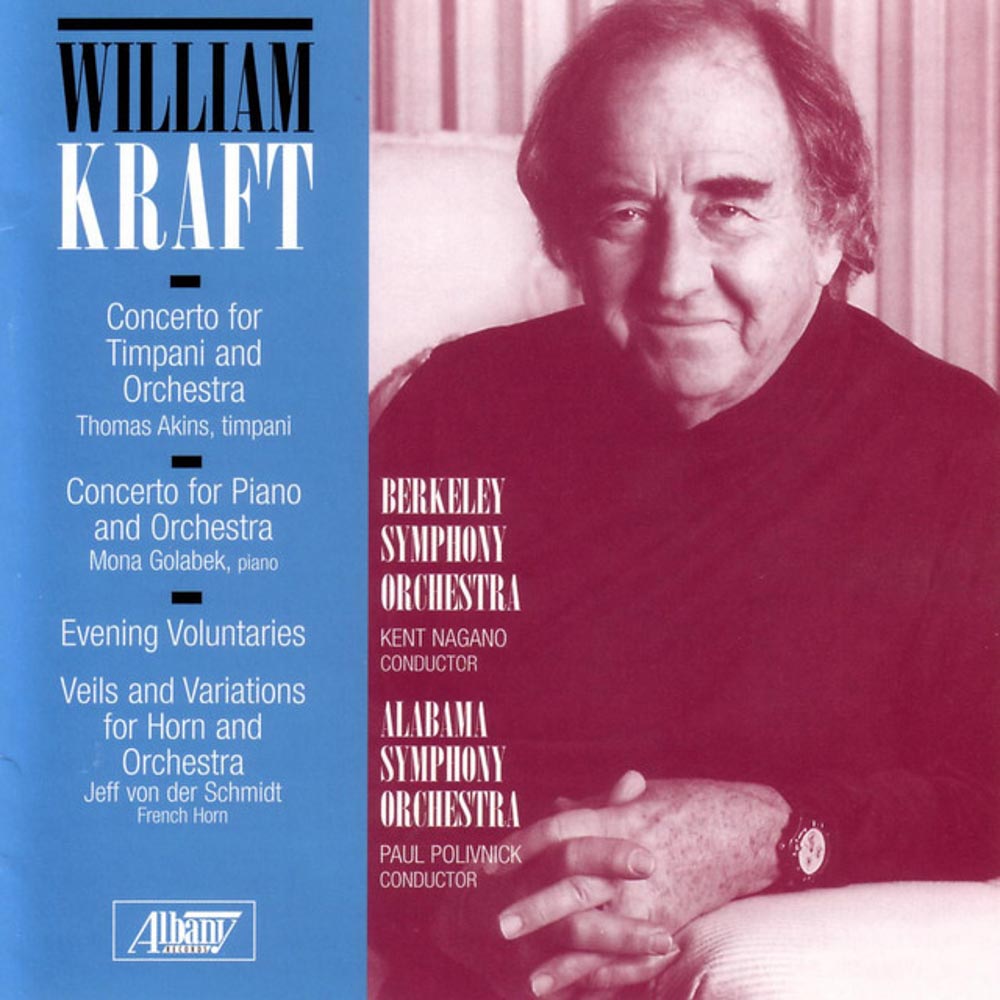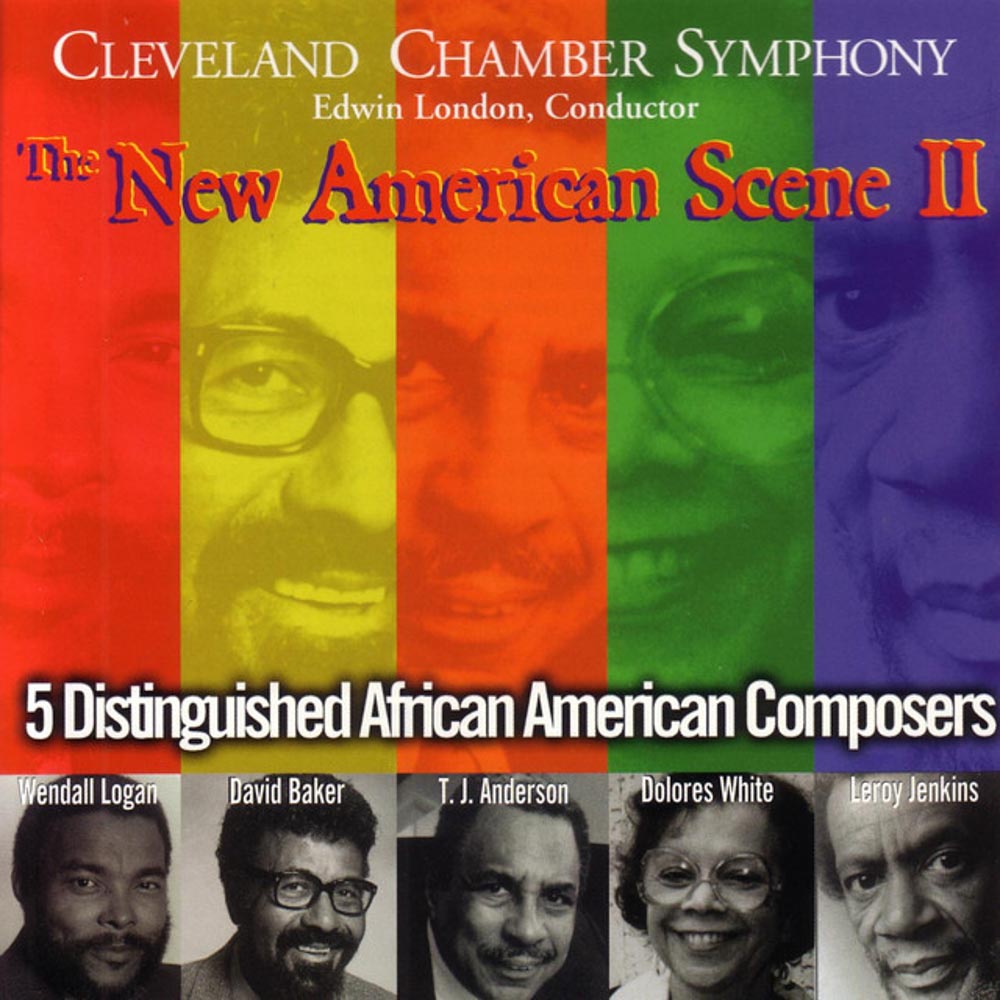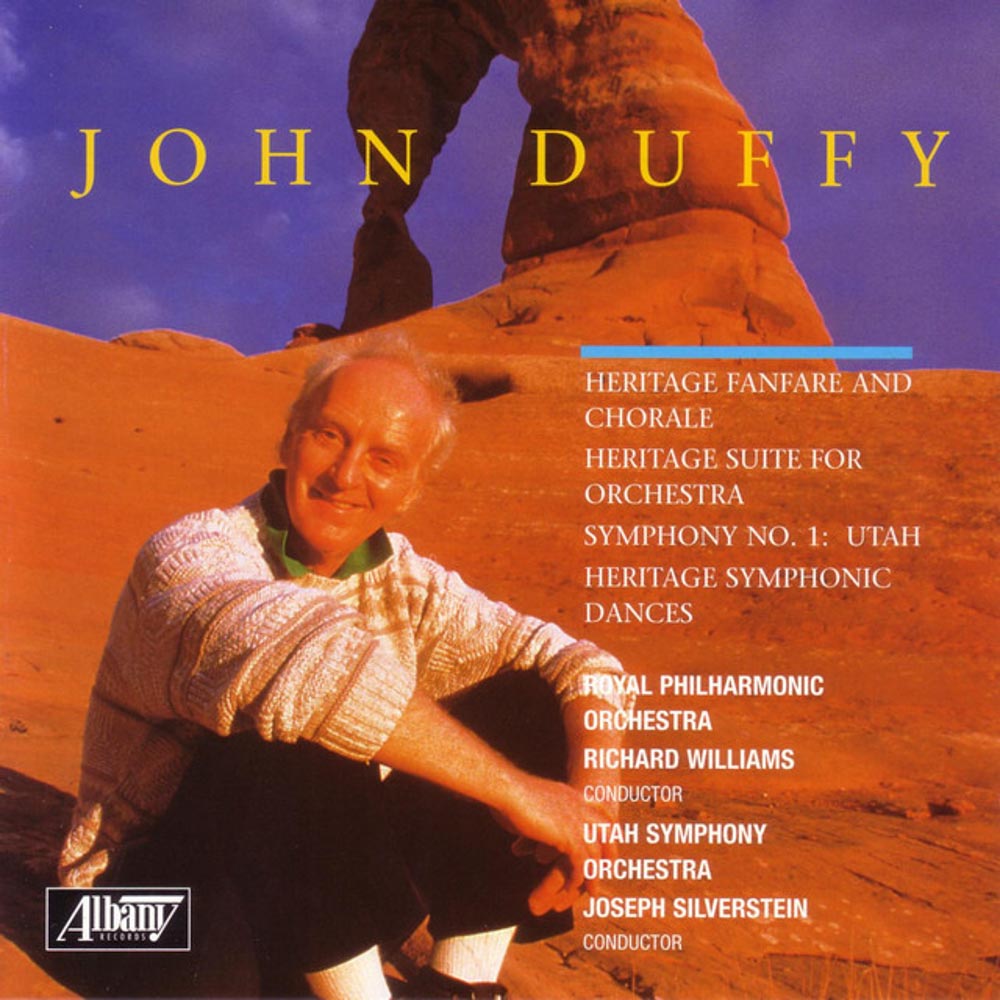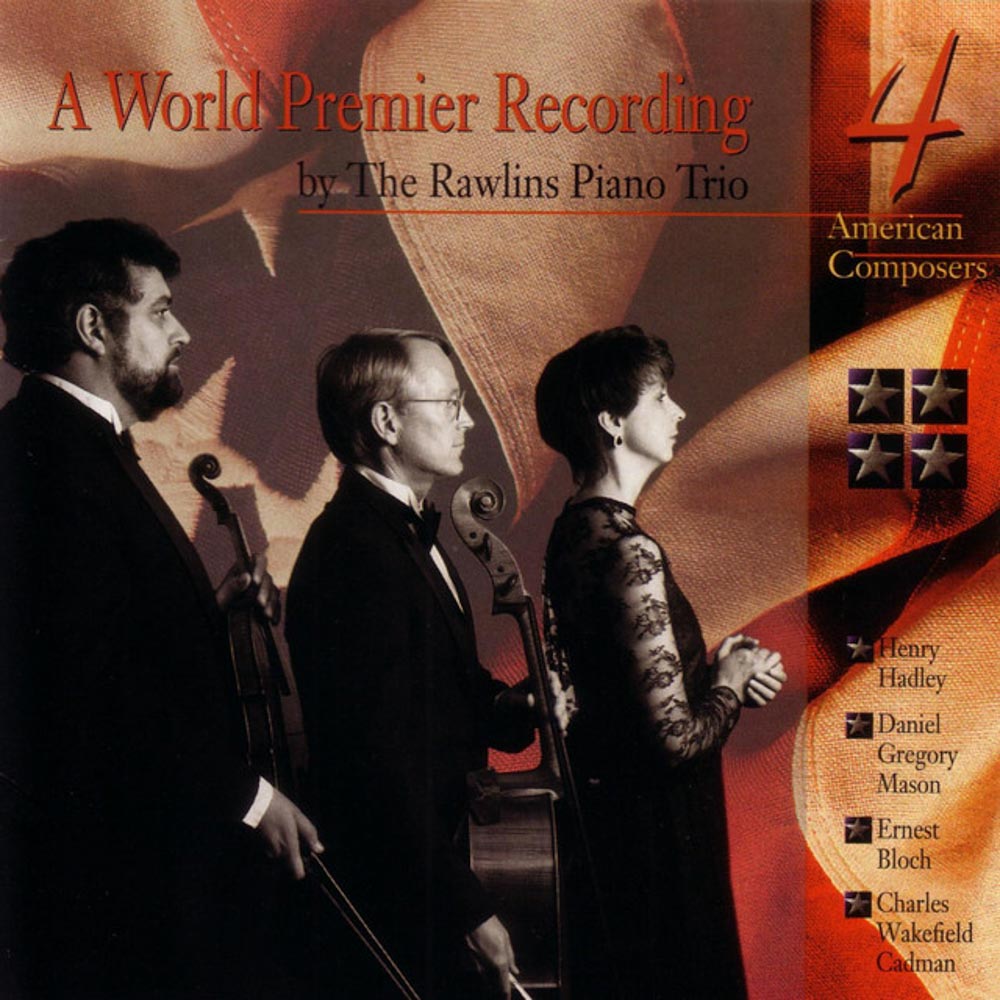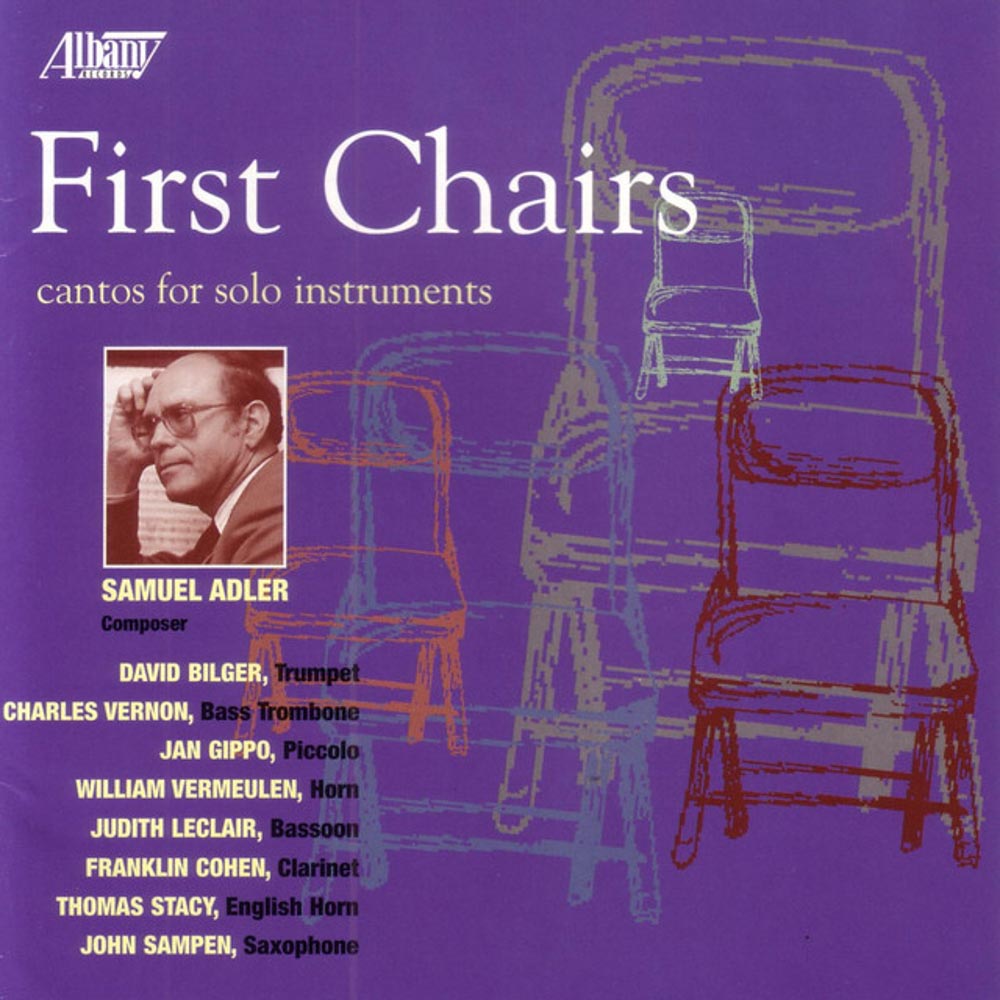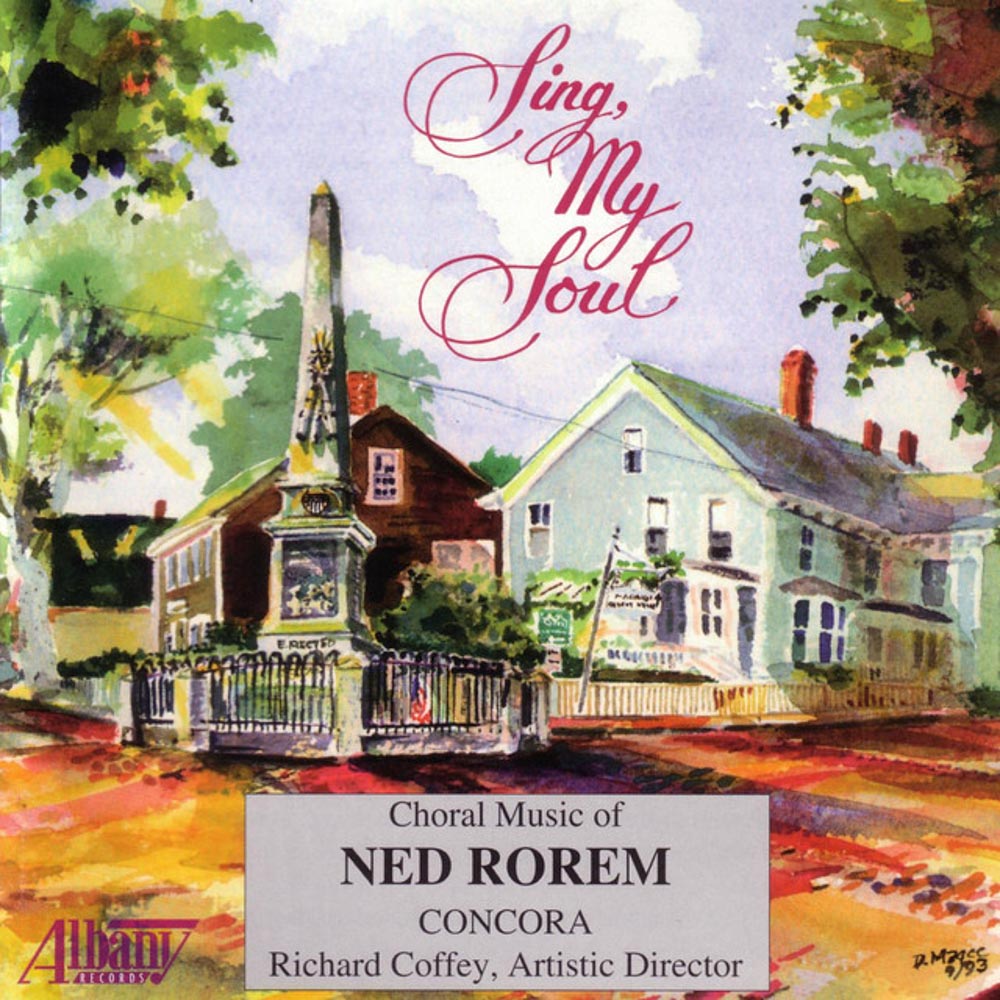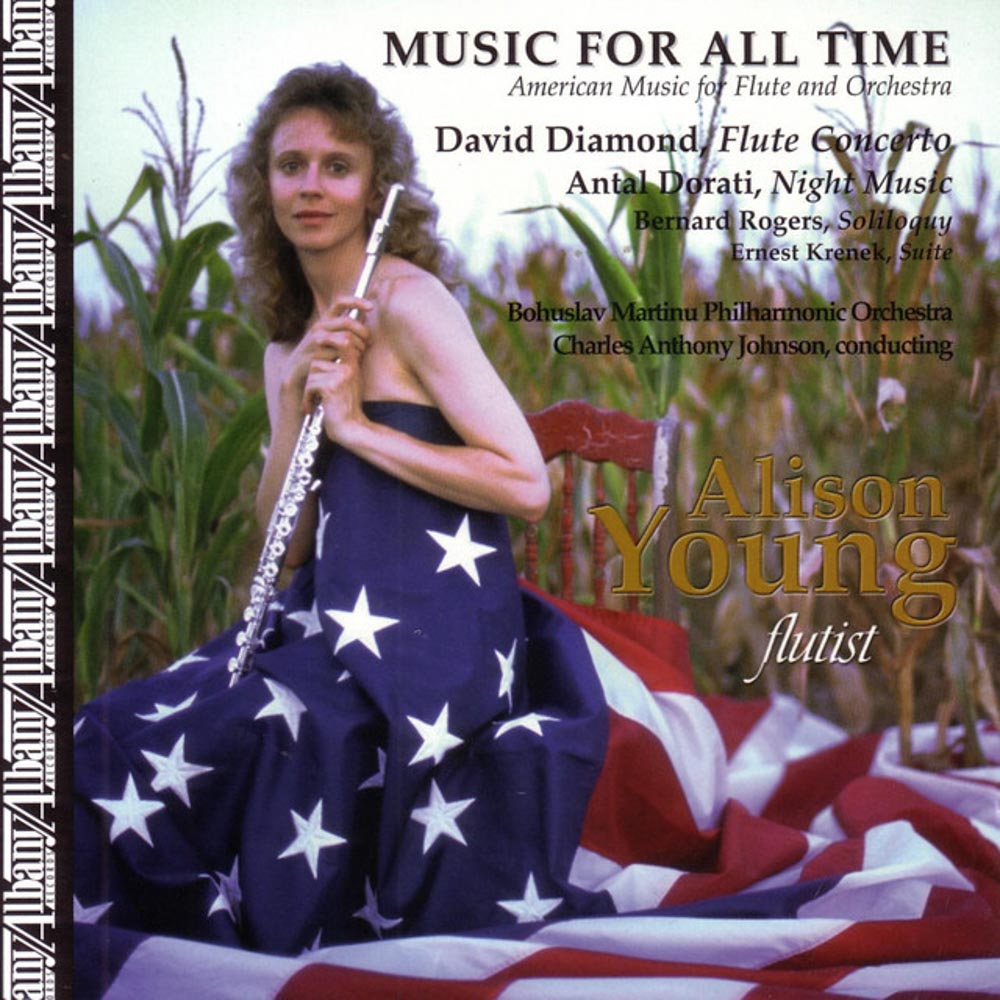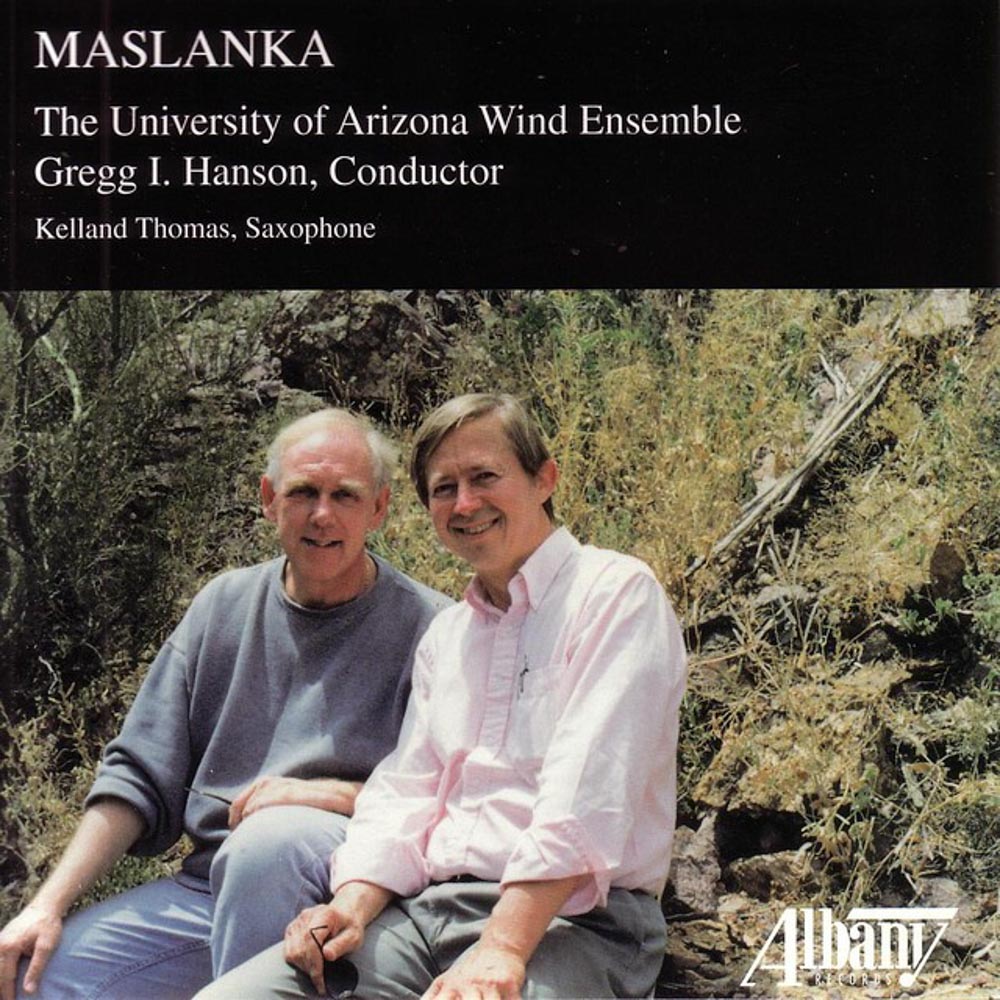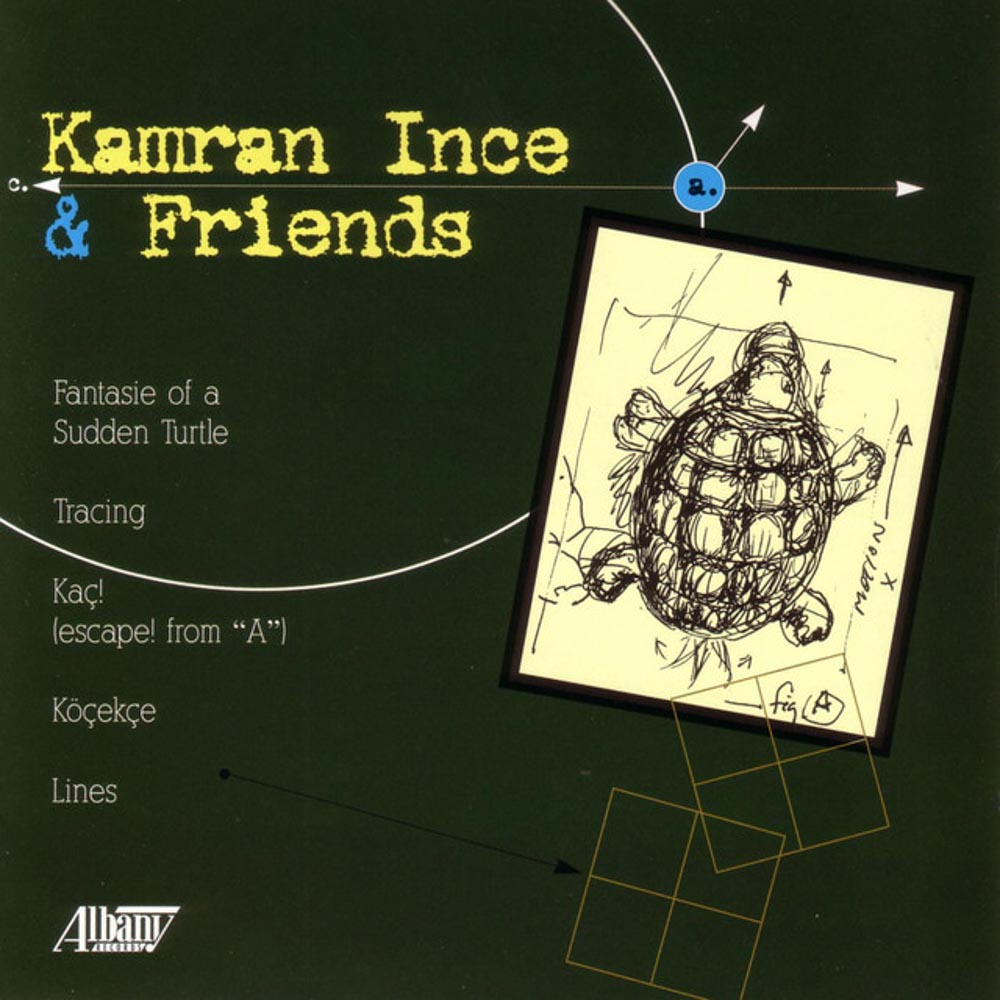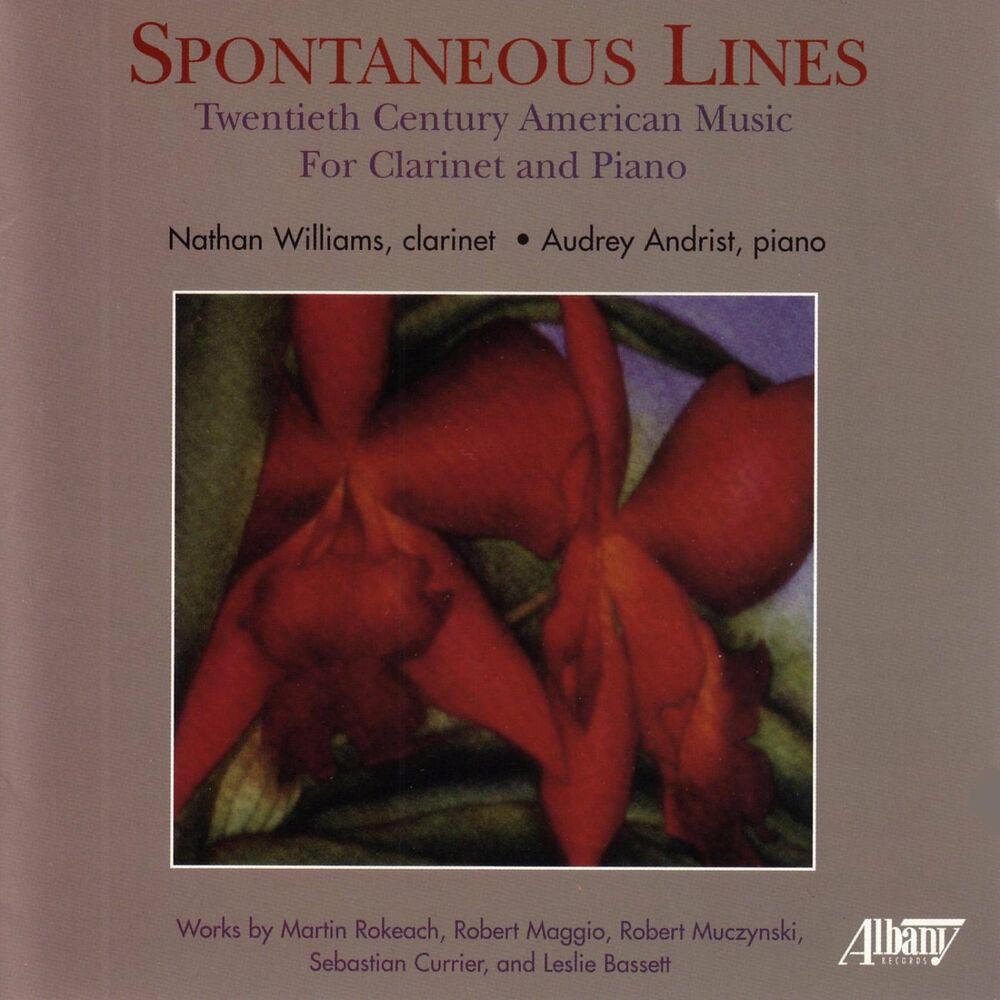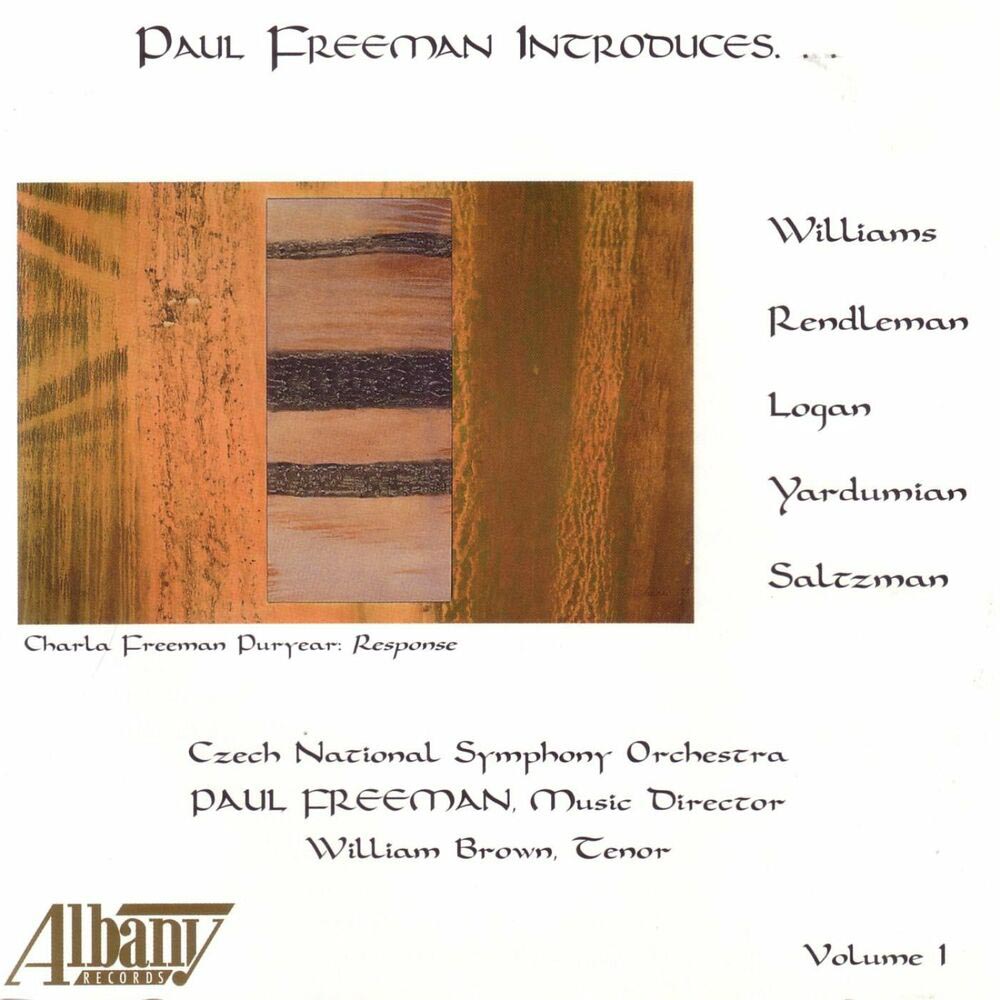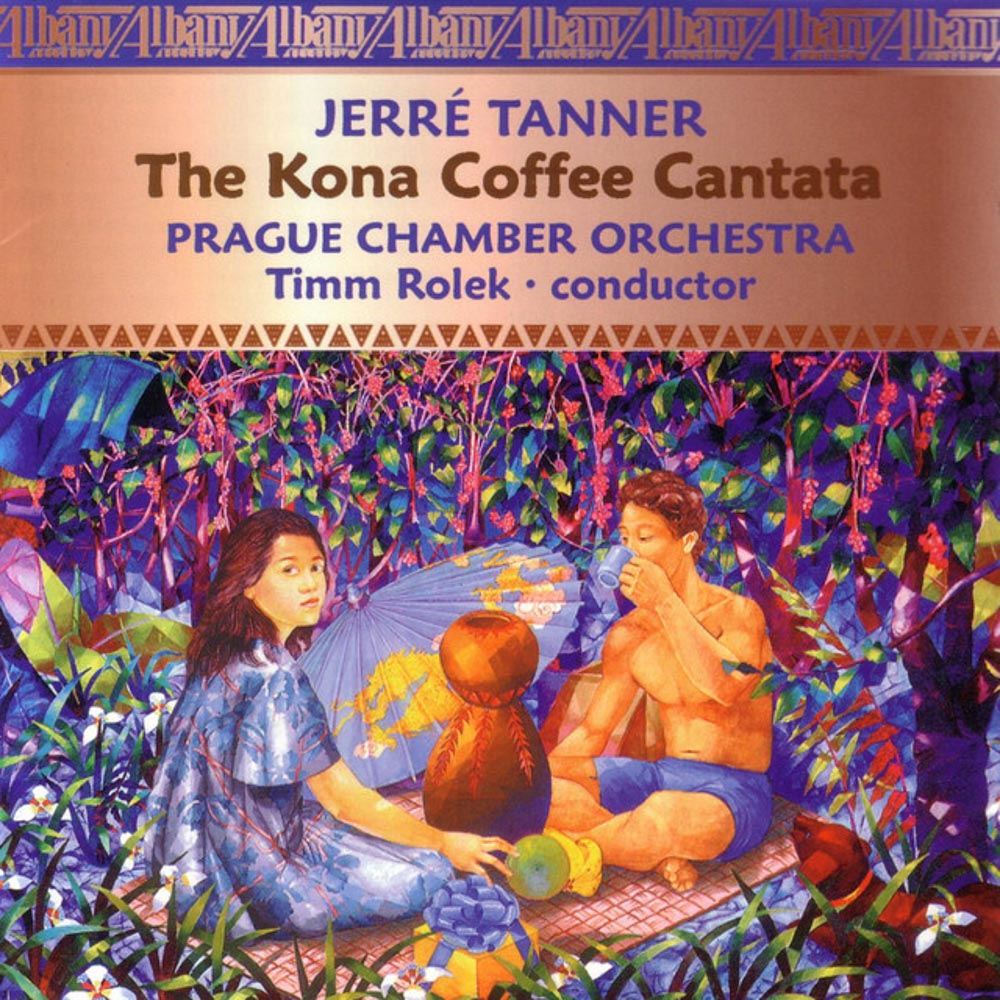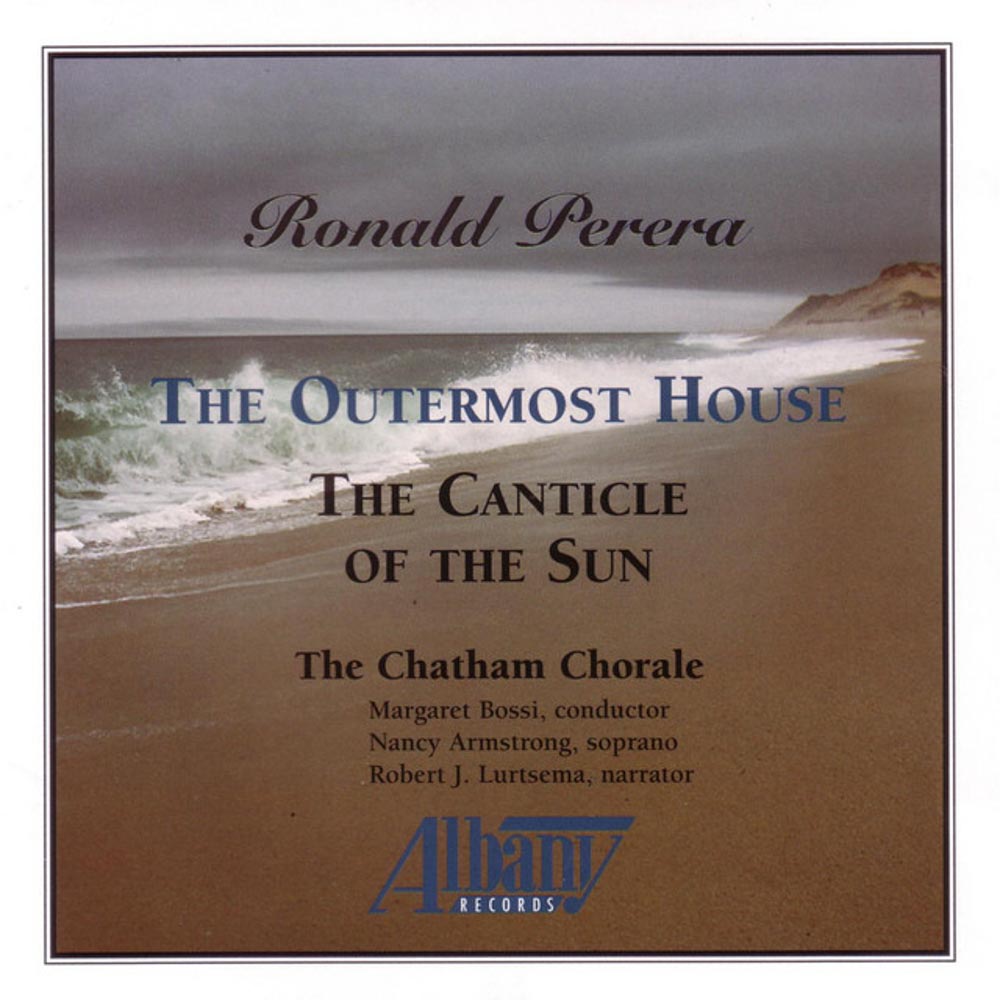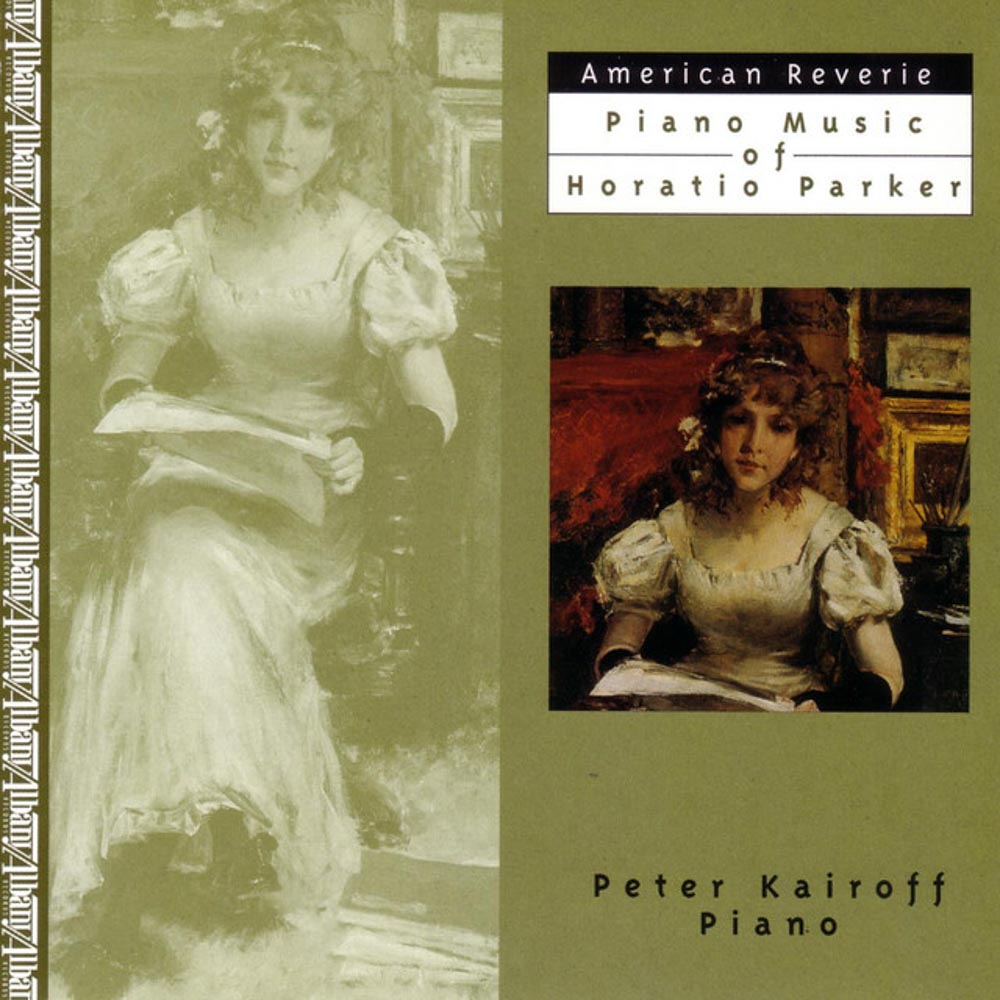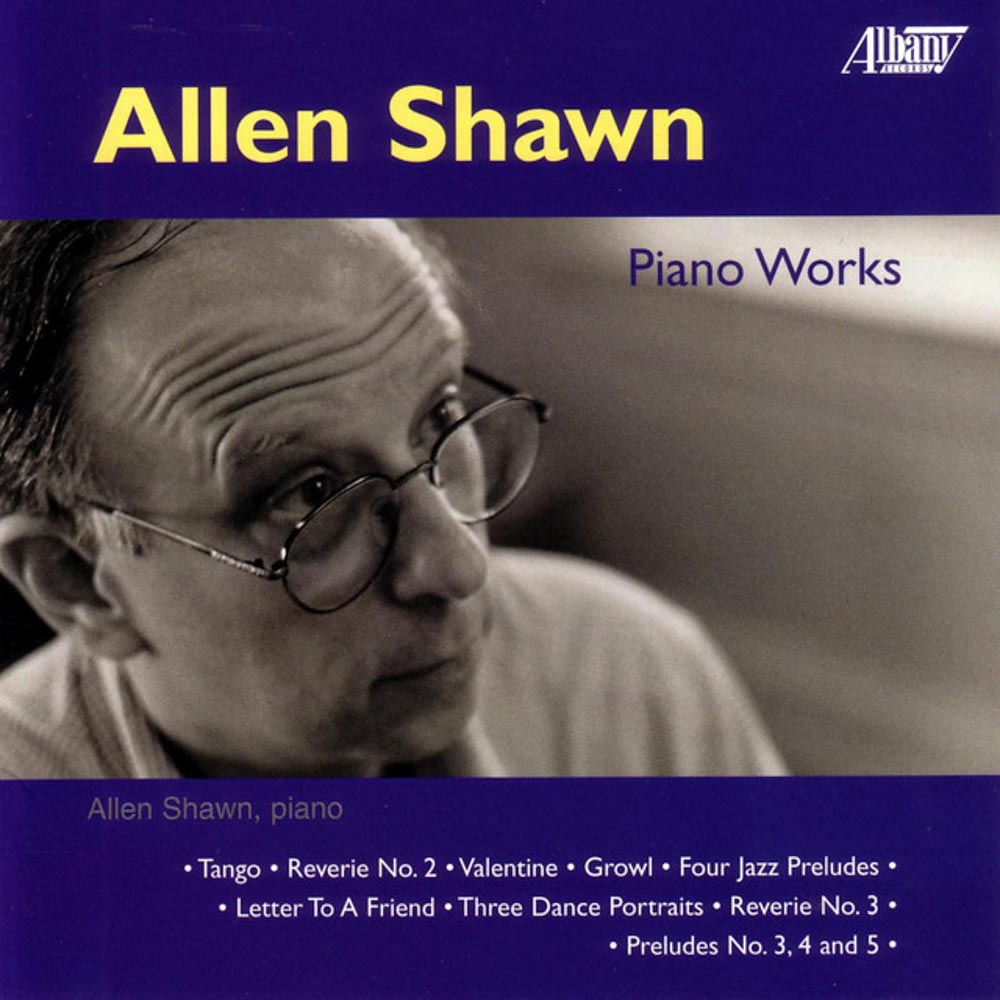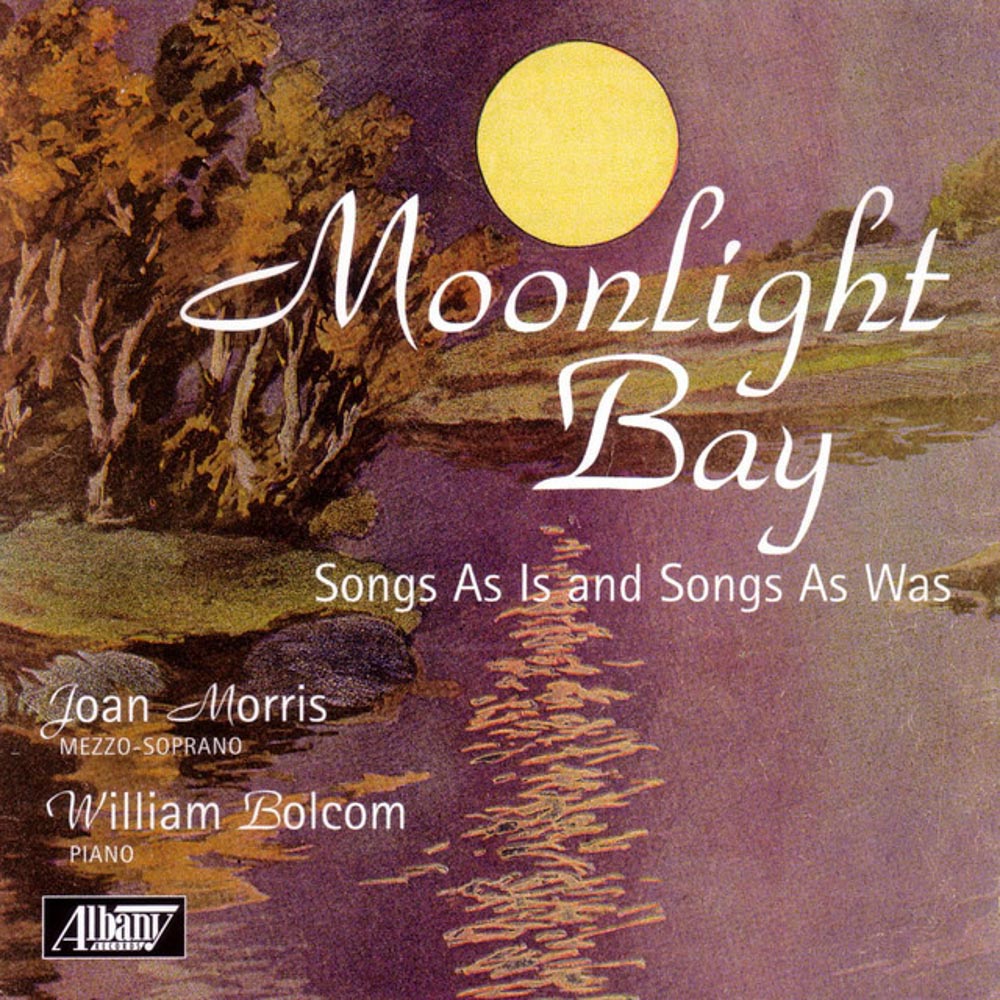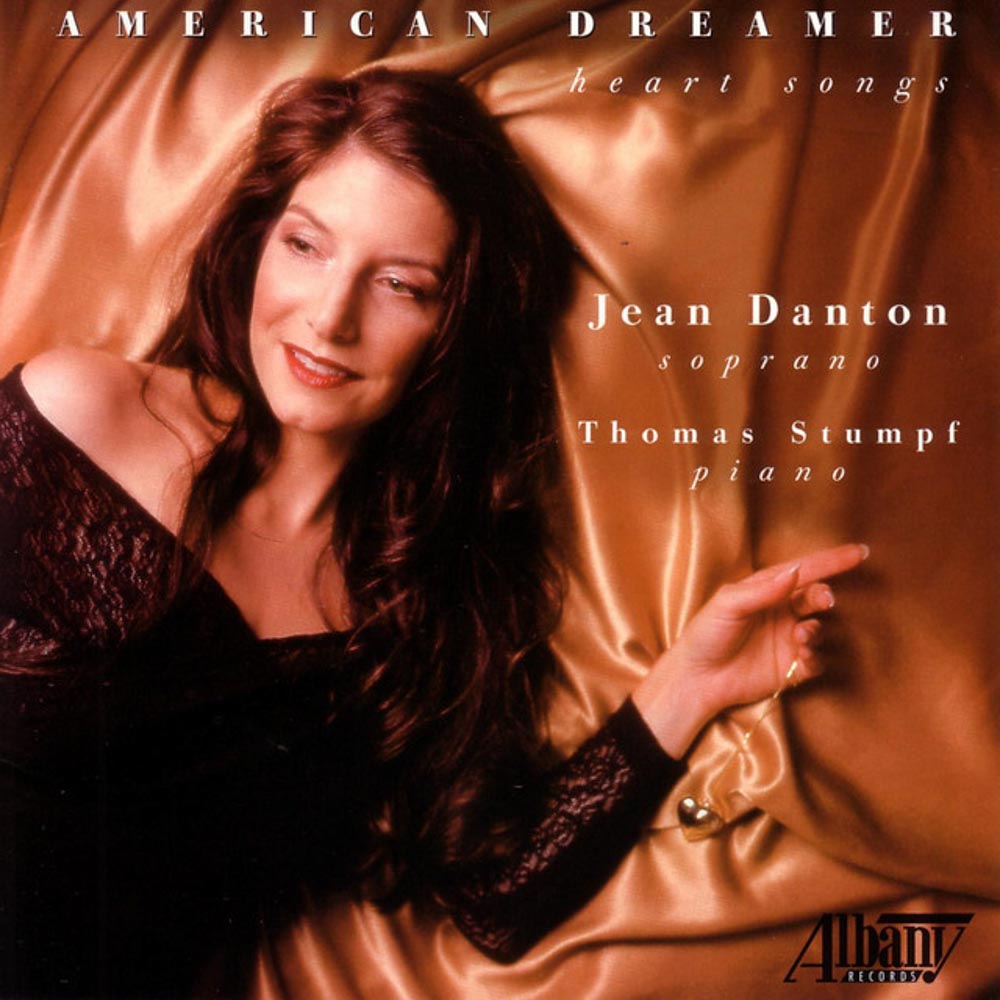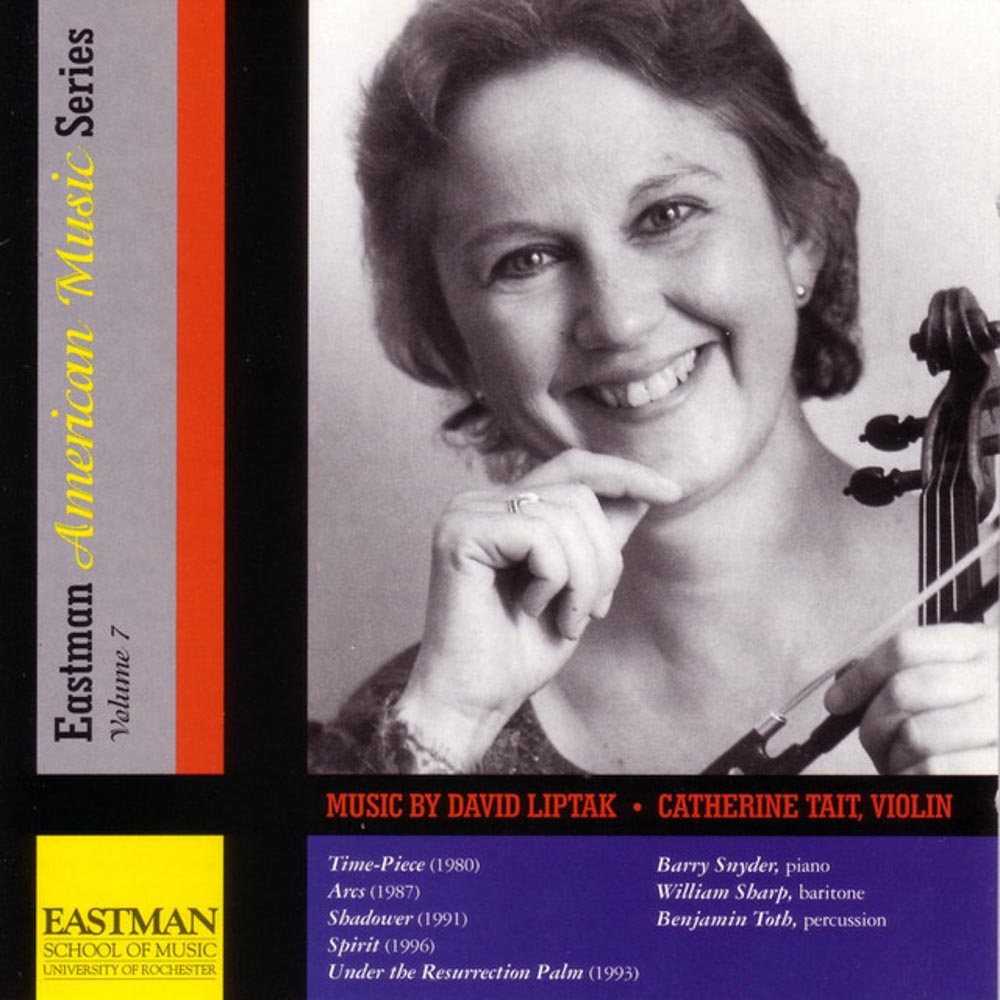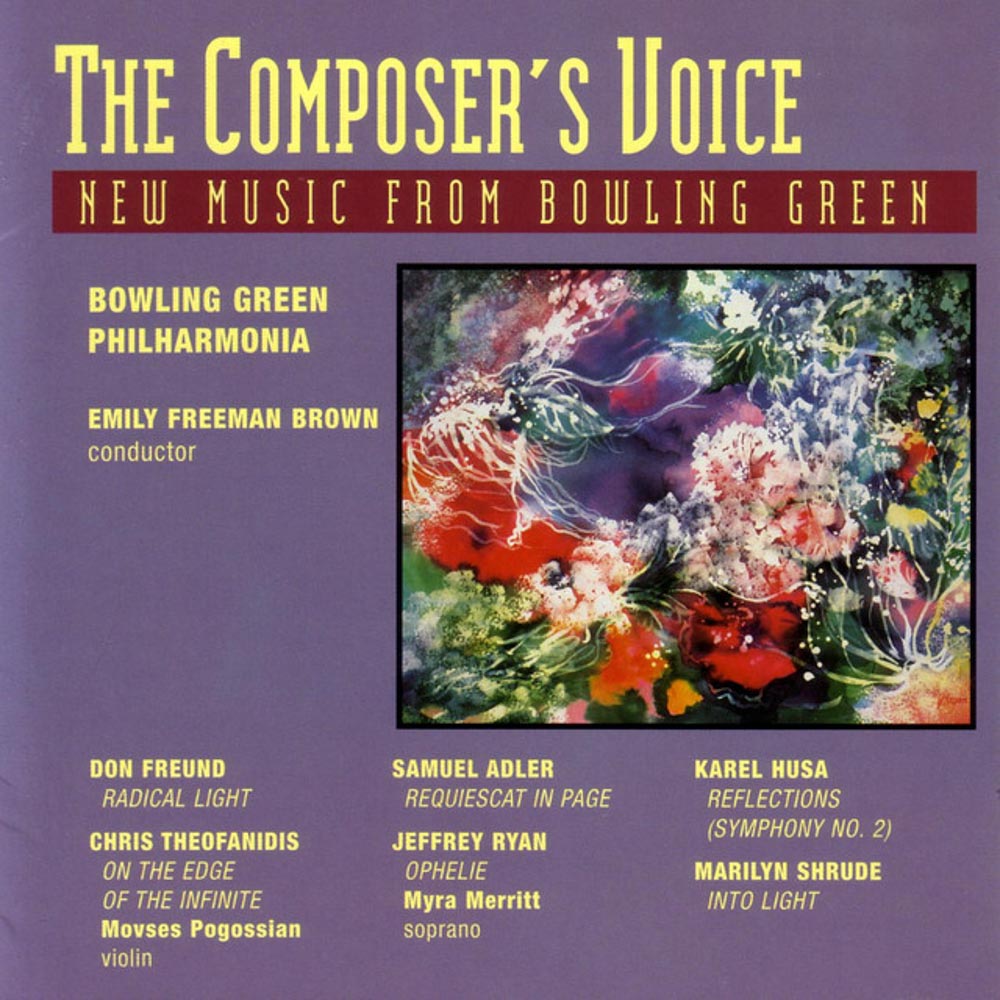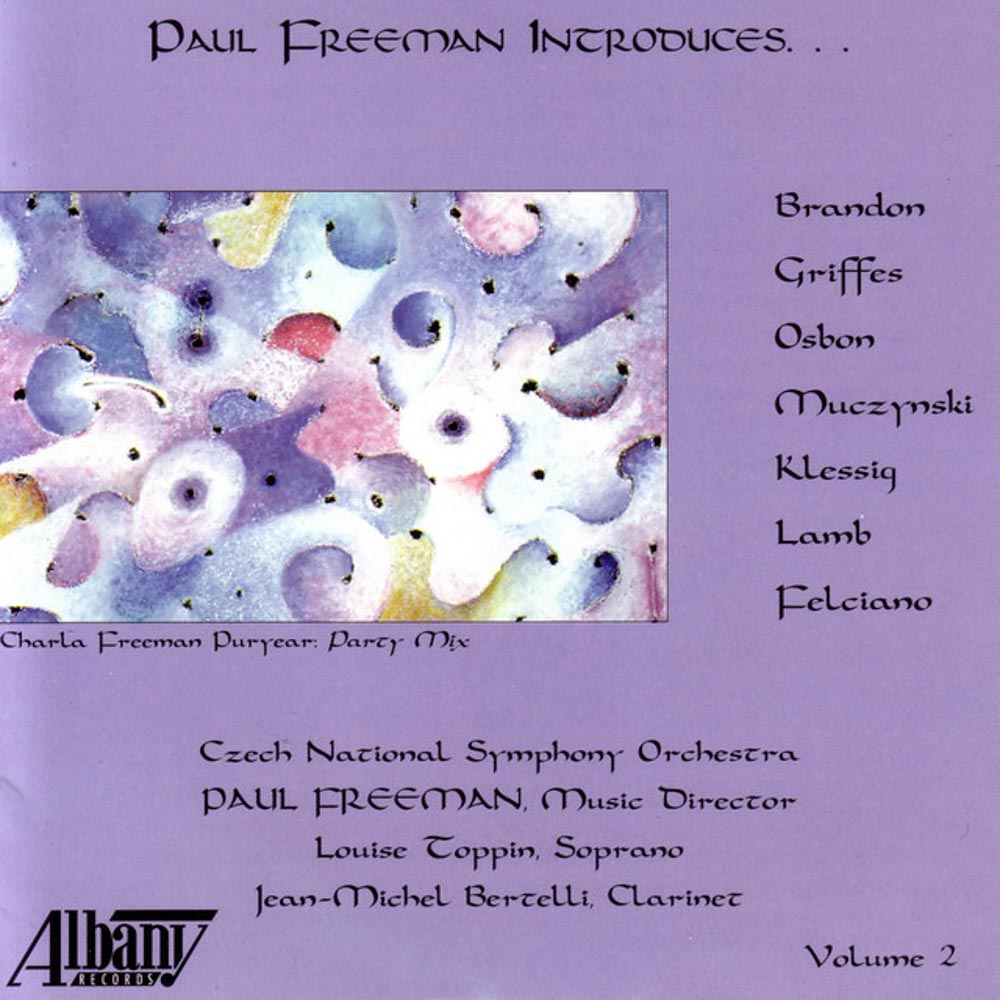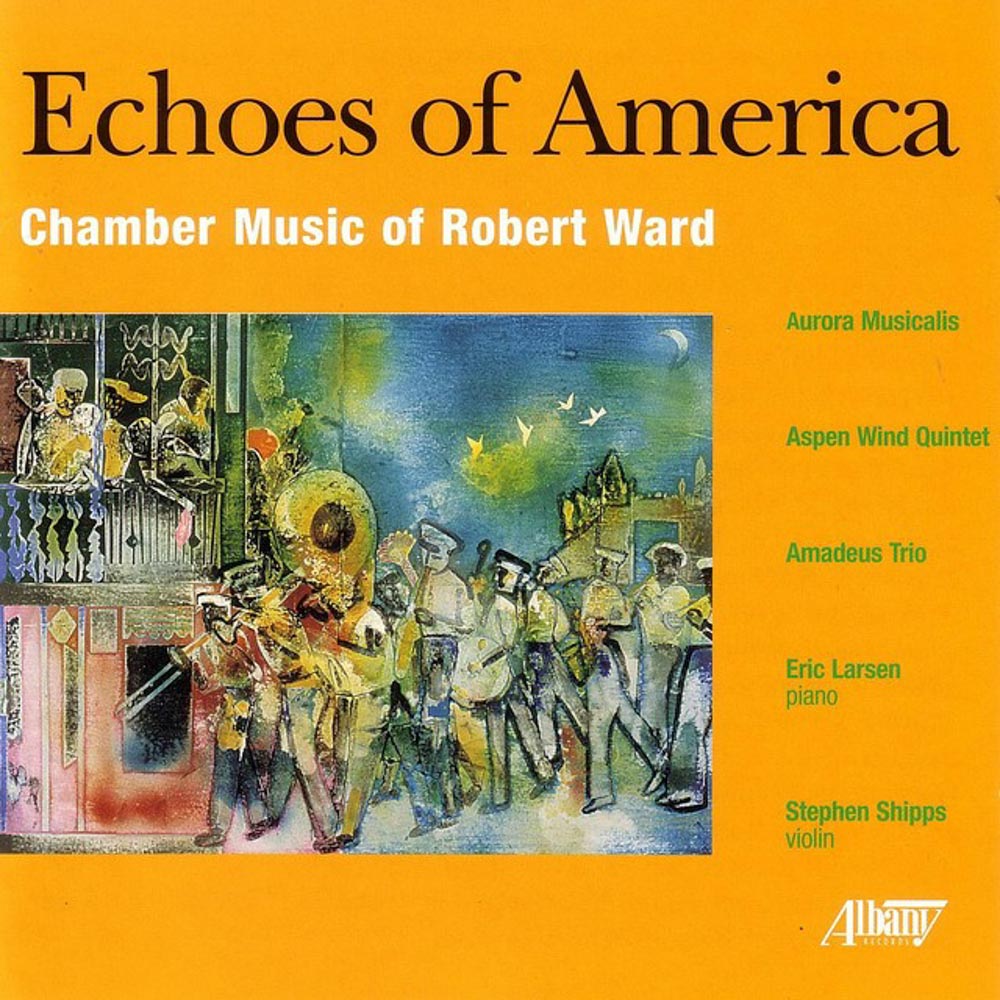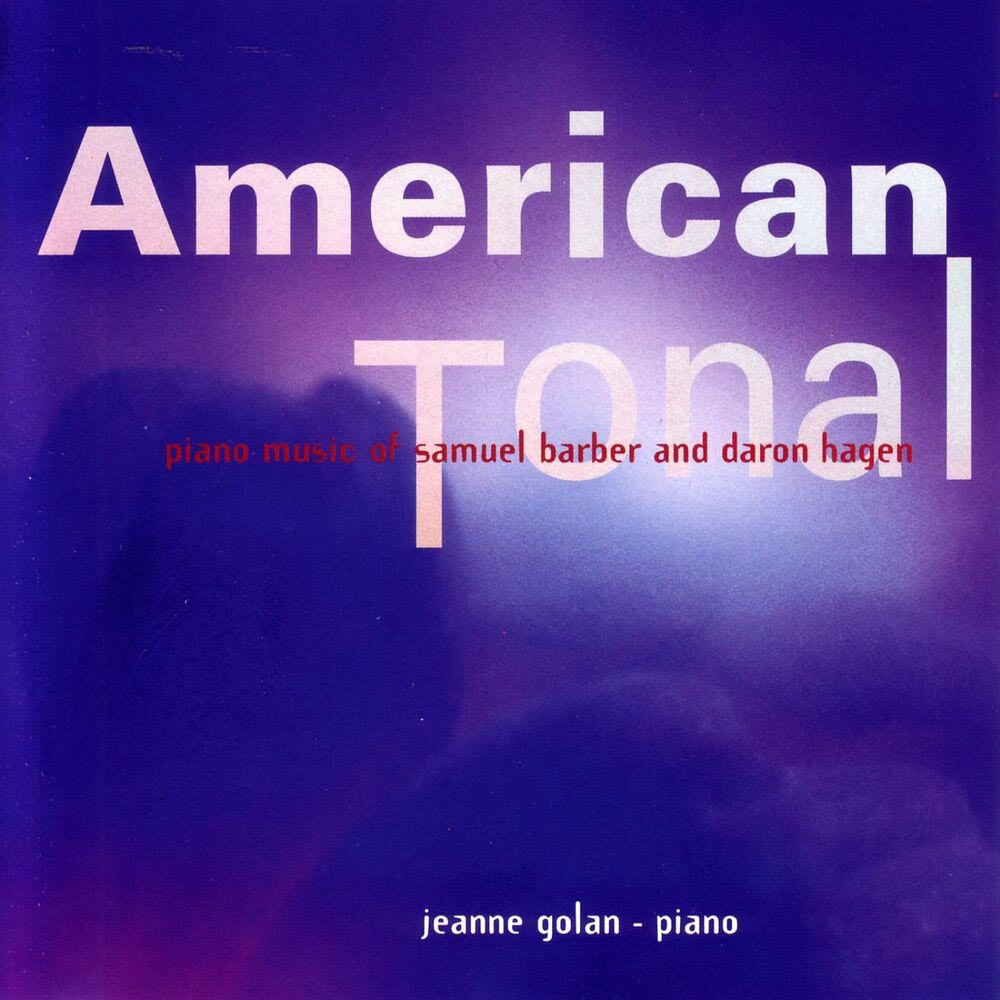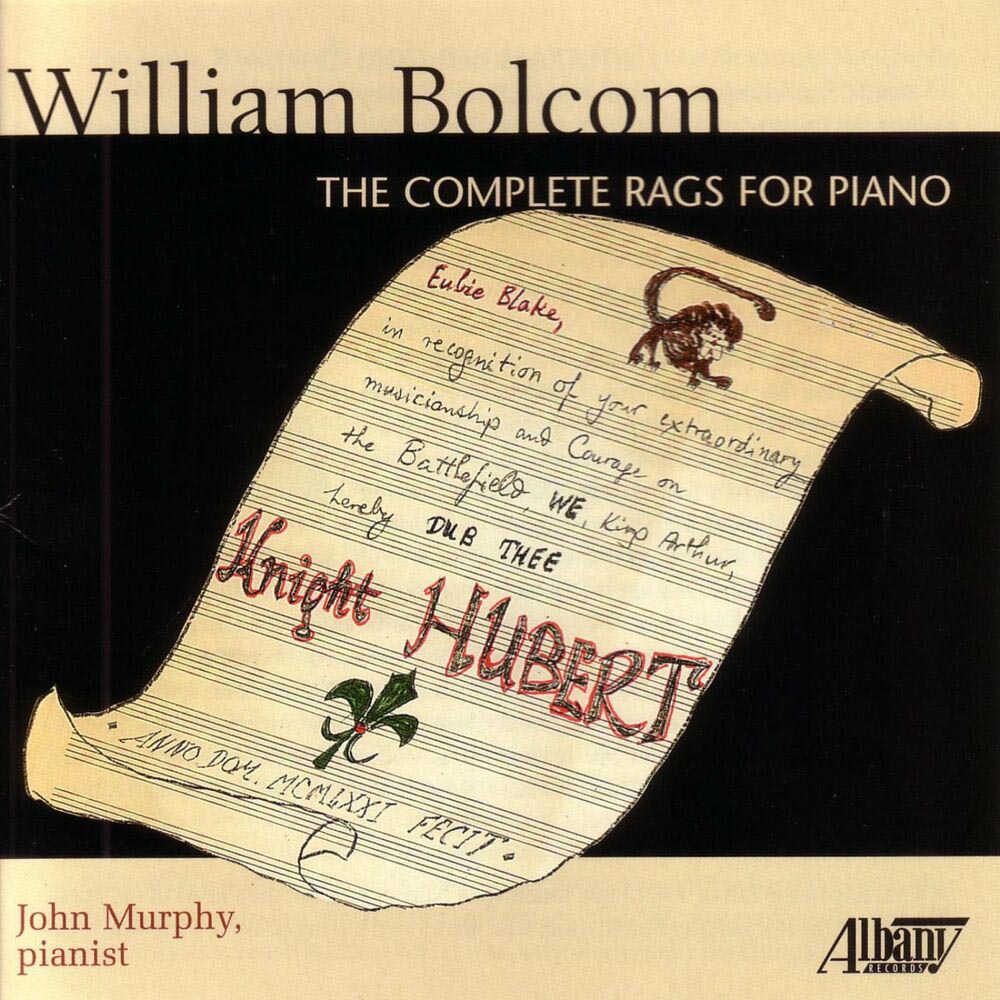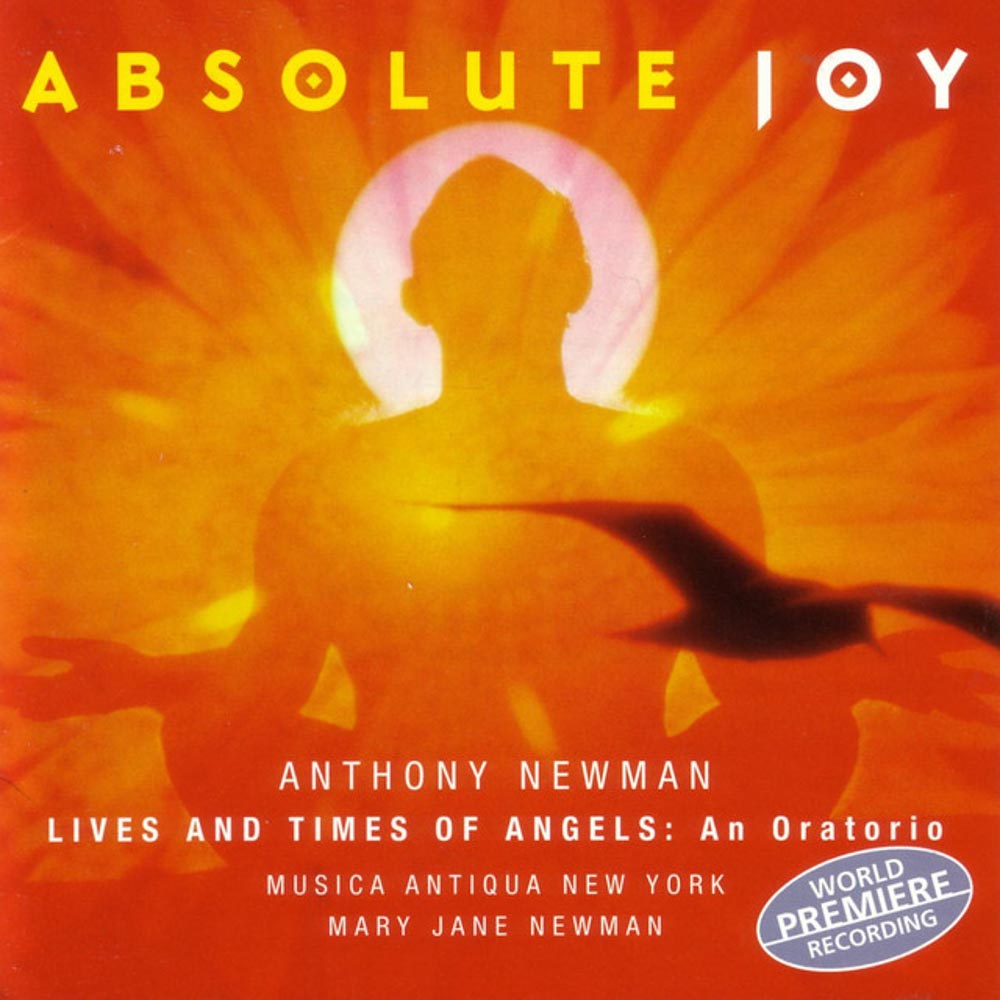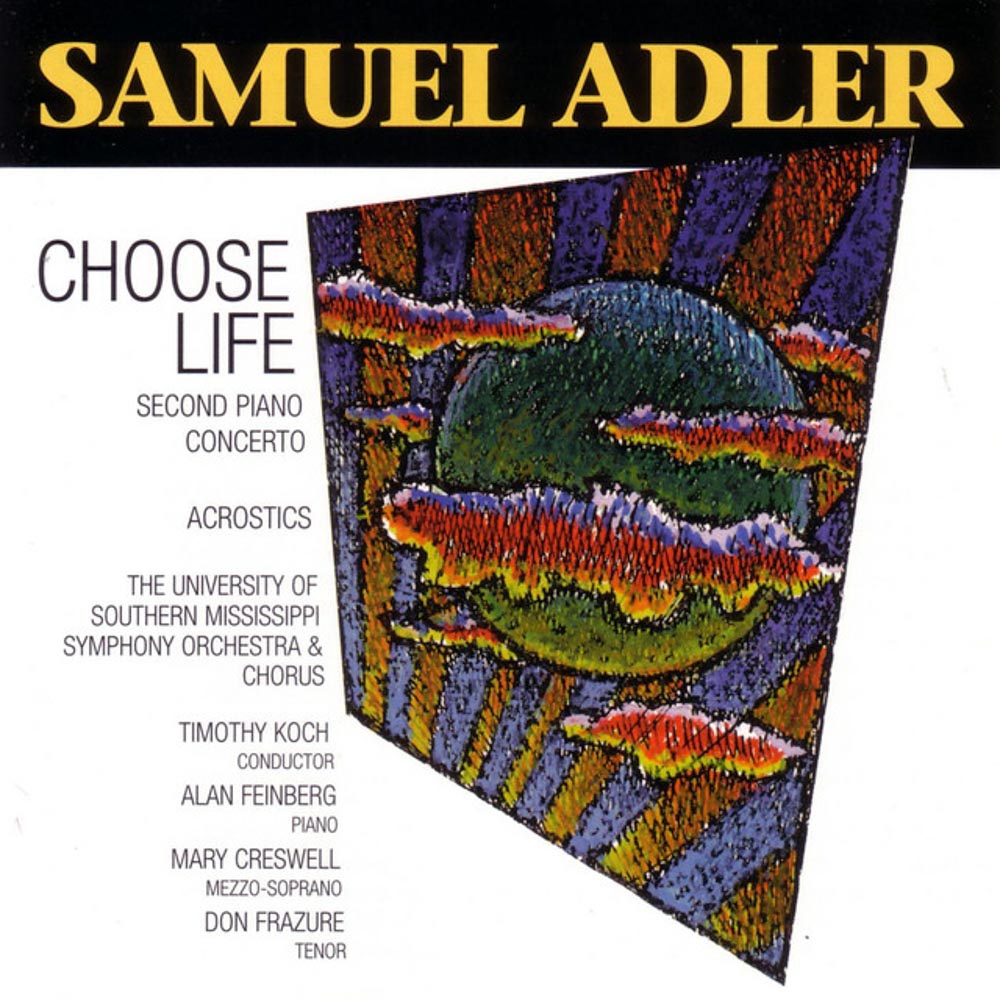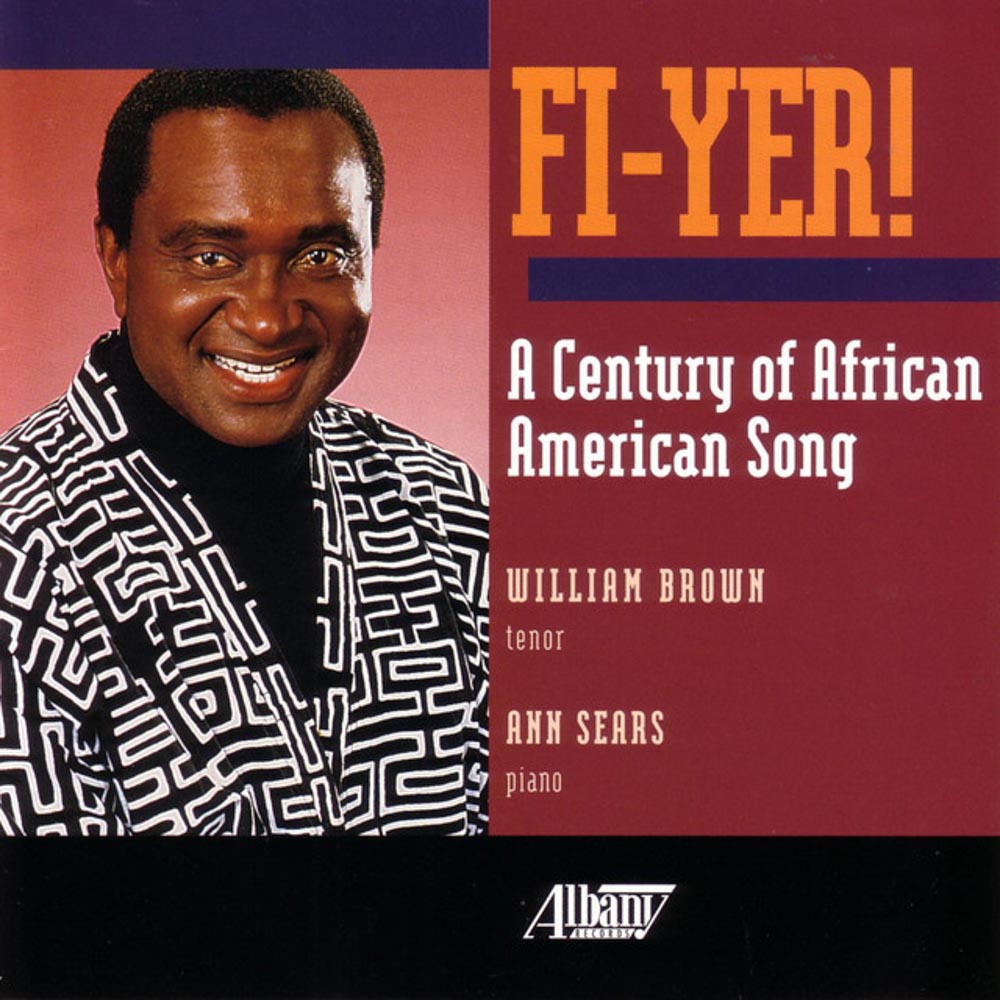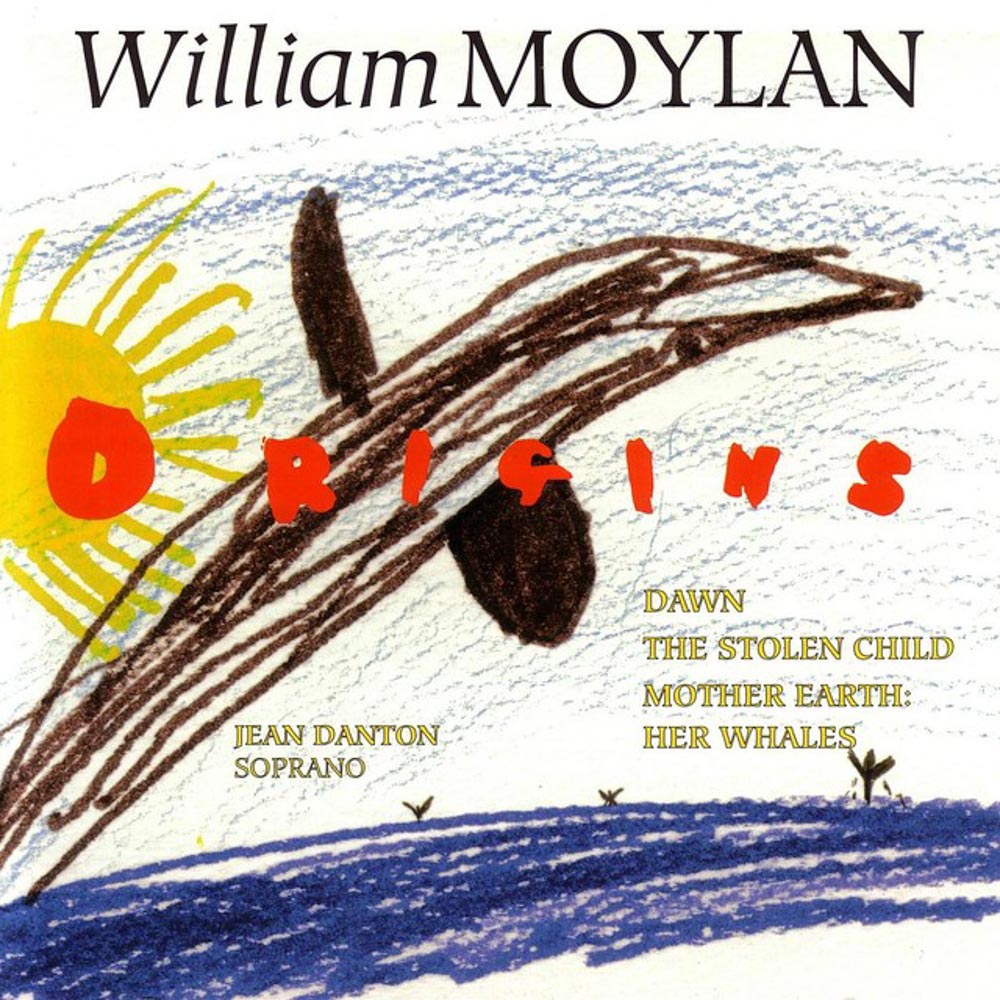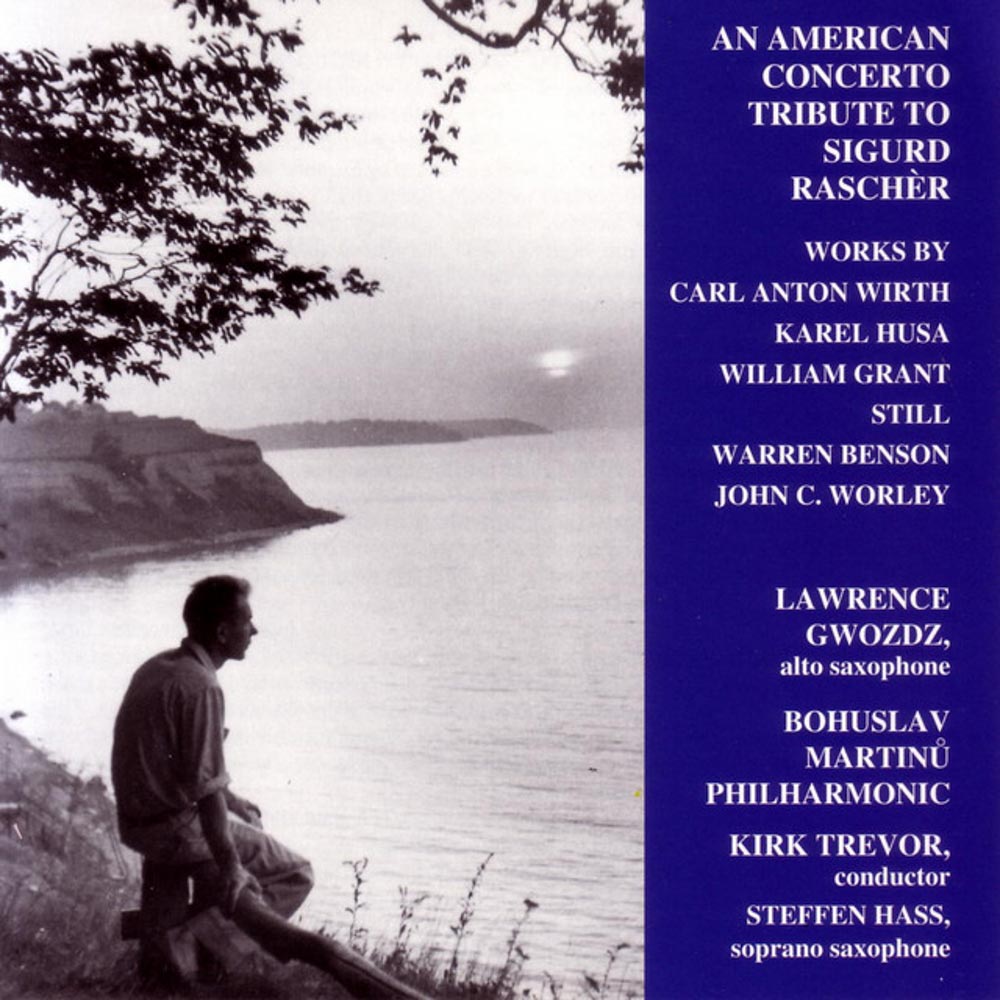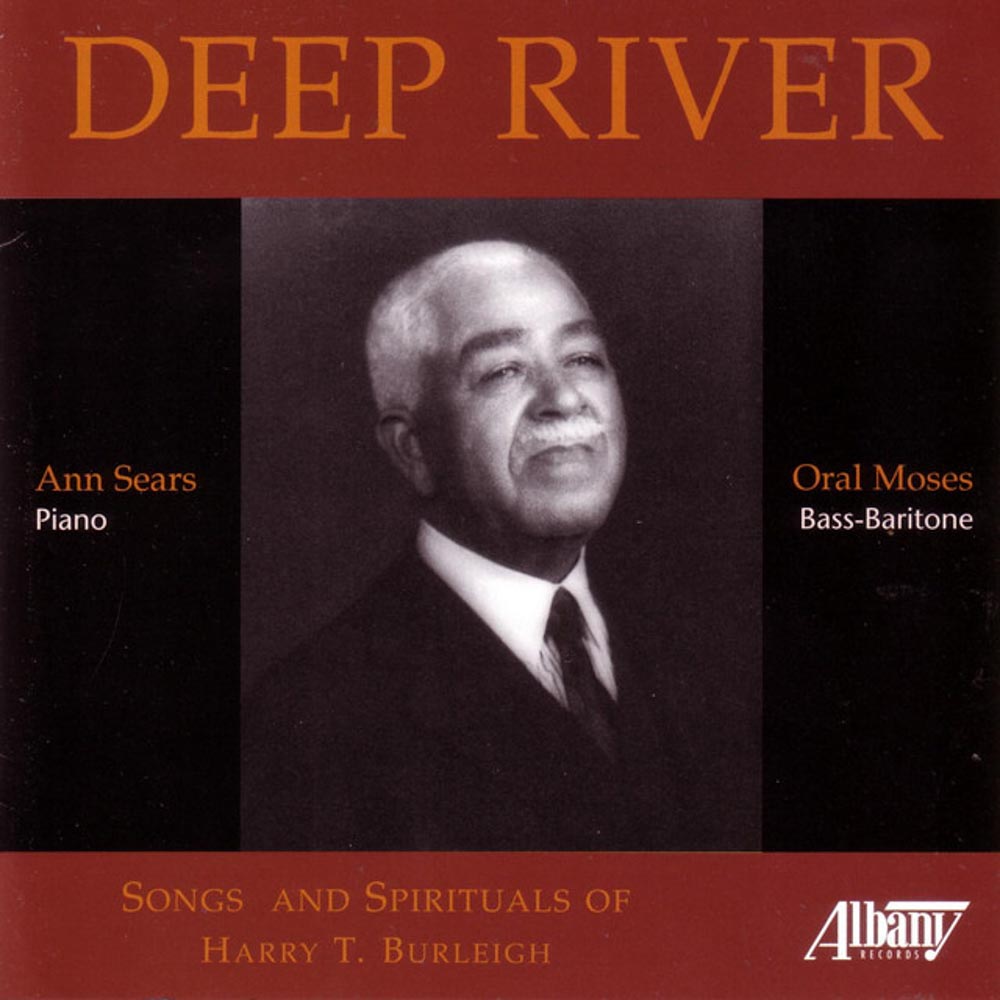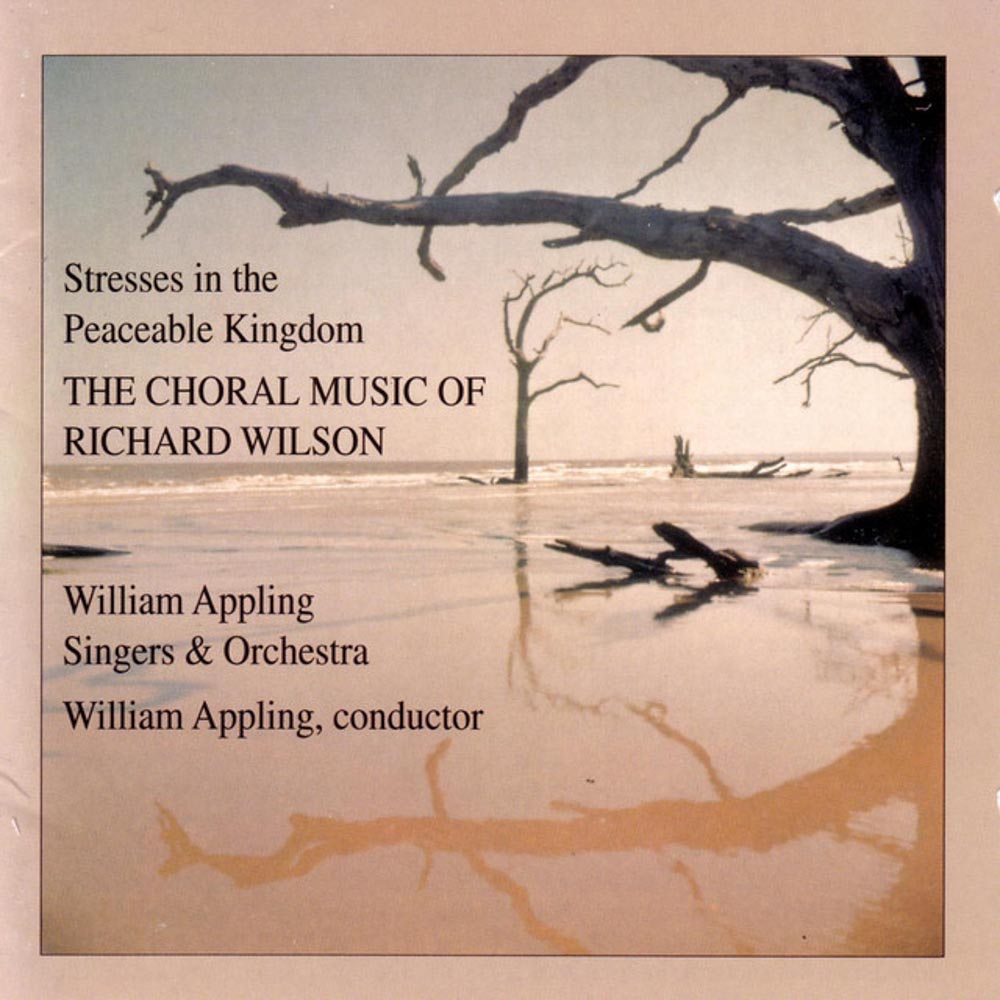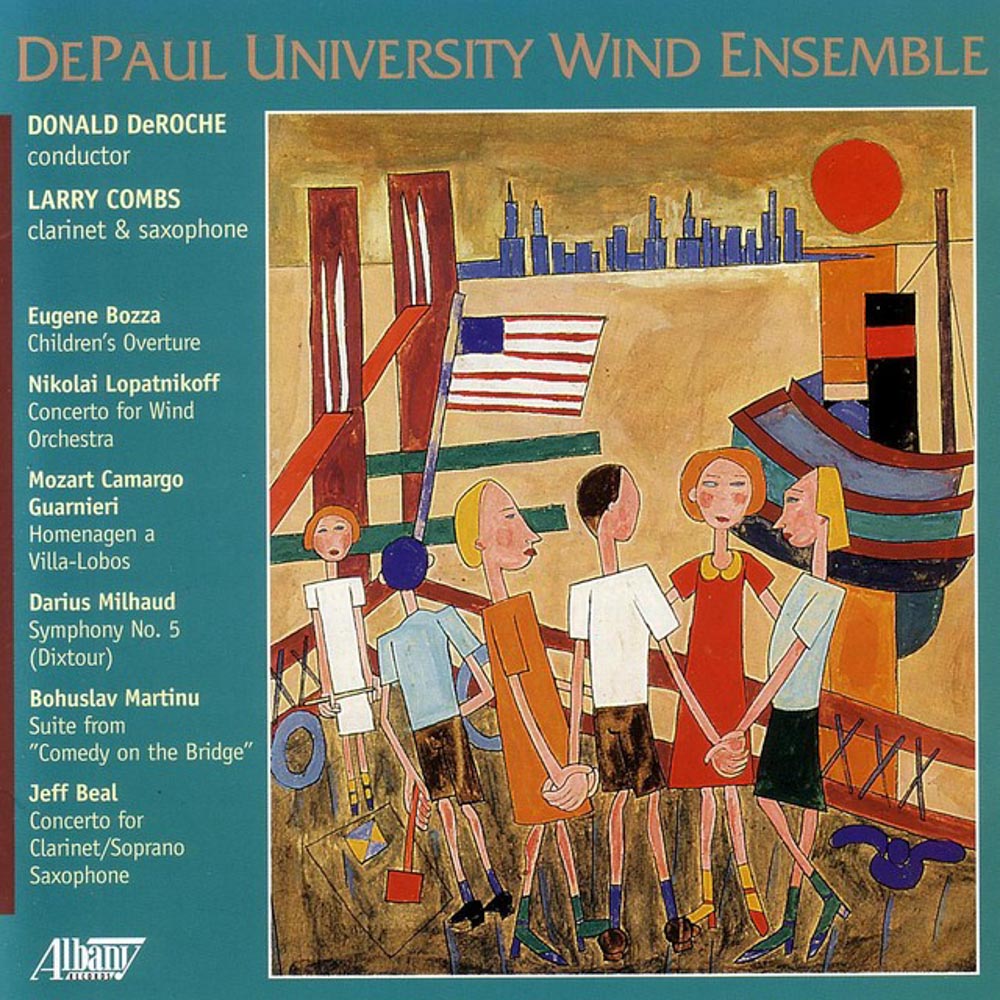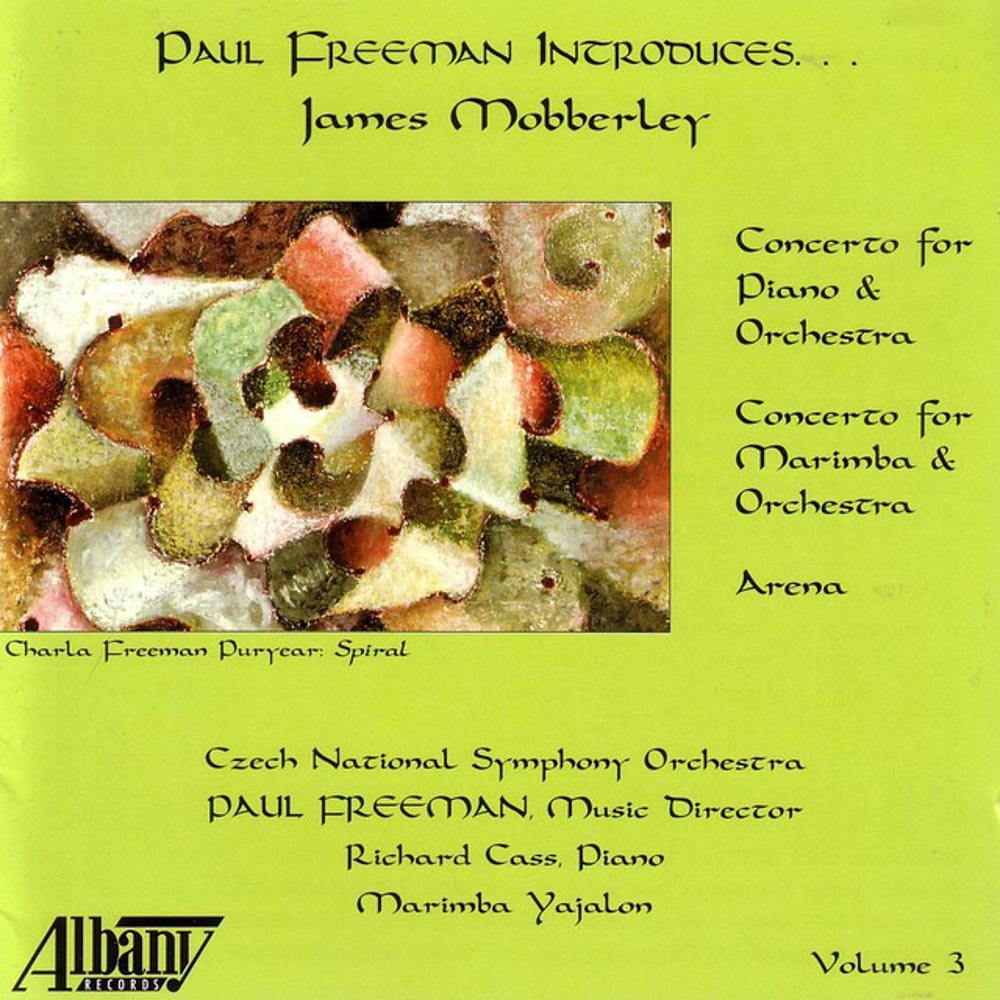Catalog #: TROY0302
Release Date: May 1, 1999OrchestralThe Concerto for Timpani and Orchestra was commissioned by Percussion Projects for Thomas Akins and the Indianapolis Symphony Orchestra. The premiere took place March 9, 1984, with John Nelson conducting and subsequently won the second prize in the Kennedy Center Friedheim Awards. The music was composed during 1983 at the MacDowell Colony. About his Piano Concerto William Kraft writes: "In 1971, the Ford Foundation announced its second round of grants to soloists who, in turn, were to select composers of their choice. One of the recipients was the young and very dramatic pianist Mona Golabek. After nearly a year of searching, listening and interviewing, Ms. Golabek called me to discuss the project, and eventually offered me the commission." The concerto was written during 1972-1973 and then revised in 1989. It was John Cerminaro who asked William Kraft to write a piece for him. Evening Voluntaries was composed in 1980, but sat unplayed because Mr. Cerminaro felt it was unplayable. Mr. Kraft prevailed and the piece was given its premiere by Jeff von der Schmidt on May 16, 1983, at the Monday Evening Concerts in Los Angeles. It was Jeff von der Schmidt who this time commissioned Veils and Variations. It was completed in May, 1988. It was first performed by the forces heard in this recording on January 27, 1989. It won the first prize in the Kennedy Center Friedheim Awards.
Catalog #: TROY0303
Release Date: January 1, 1999OrchestralIf you are looking for a disc of all WORLD PREMIERE performances of some very appealing American music, this is the disc for you. Wendell Logan is a composer and saxophonist who was educated at Florida A & M University, the American Conservatory, Southern Illinois University and the University of Iowa. He is presently chairman of the department of jazz studies at Oberlin Conservatory. Roots, Branches, Shapes and Shades (of Green) was commissioned by the Cleveland Chamber Symphony and first performed by them in February, 1991. It was composed for the pianist Neal Creque. Thomas Jefferson Anderson is Fletcher Professor of Music Emeritus at Tufts University in Medford, Massachusetts. He holds degrees from West Virginia State University, Penn State and the University of Iowa. He studied with Scott Huston, Philip Bezanson and Darius Milhaud. Chamber Concerto (Remembrances) was commissioned by the Cleveland Chamber Symphony and premiered in 1988. Leroy Jenkins is a virtuoso violinist, composer, arranger and educator. Born in Chicago, he earned a music degree at Florida A & M University and studied Baroque and classical masters while also developing an interest in improvised music. Under the spell of jazz greats like Charlie Parker, Ornette Coleman and John Coltrane he returned to Chicago and became a charter member of the Association for the Advancement of Creative Musicians, an Organization in which he is still active. Wonder Lust was commissioned by the Cleveland Chamber Symphony and premiered by them in 1988. Dolores White, composer, pianist, and educator, is assistant professor of music at Cuyahoga Community College. She received a bachelor's degree in piano performance from the Oberlin Conservatory and a masters in piano performance from the Cleveland Institute of Music. Her Crystal Gazing was commissioned and premiered by the Cleveland Chamber Symphony in 1994. In the composer's words its single movement explores "the world of crystal making, crystal gazing and the psychic state of mind while crystal gazing." David Baker was born in Indianapolis. He is now professor of music and chairman of the jazz department at Indiana University in Bloomington. He is a virtuoso performer as well as teacher. He received bachelor's and master's degrees from Indiana University. His teachers have included J.J. Johnson, Janos Starker, William Russo, Bernard Heiden and Gunther Schuller. His piece Parallel Planes was also commissioned and premiered by the Cleveland Chamber Symphony.
Catalog #: TROY0304
Release Date: October 1, 1998OrchestralAs founder and president (1974-1995) of Meet The Composer, an Organization dedicated to the creation, performance, and recording of music by American composers, John Duffy initiated countless programs to advance American music and to aid American composers. But there is another side to John Duffy. He has composed more than 300 works for symphony Orchestra, theater, television and film. He grew up in the Bronx, one of 14 children of Irish immigrant parents. He studied with Copland, Cowell, Dallapiccola and Solomon Rosowsky whom he credits with insisting uncompromisingly on learning the craft of music composition and developing the discipline and patience necessary to the art. The Heritage music on this disc is a reissue of the music on the old ASV disc which has been long unavailable. The performance of the Symphony No. 1 is a new one and is different from the one that appears on Koss Classics. Heritage, Fanfare and Chorale, Heritage Suite for Orchestra and Heritage Symphonic Dances have all been drawn by Mr. Duffy from the score he composed for the nine-hour PBS series Heritage: Civilization and the Jews. This wonderful, stirring music earned for Mr. Duffy an Emmy. The Chicago Tribune called the music "haunting, memorable and brilliant." The Utah Chapter of the Sierra Club, Gibbs Smith, president, commissioned Symphony No. 1 in order to draw attention to the endangered, pristine wilderness lands of southern Utah. The score is dedicated to Mr. Smith and the Sierra Club. The Symphony was premiered by Paul Connelly and the Orchestra of St. Luke's at Avery Fisher Hall in New York City on November 29, 1989. Mr. Duffy's tuneful, energetic music should find a large and welcome audience.
Catalog #: TROY0305
Release Date: January 1, 1999ChamberThe composers of these trios all were born within a ten year span, and were of considerable significance in the first third of the 20th century, when American music was first finding its voice. They are representative of different currents in the musical stream, and the details of their lives and interactions provide insight into the American classical world music world during a fascinating period in our history. Hadley was born in Somerville, Massachusetts and studied with Chadwick at the New England Conservatory. He also studied in Europe with Ludwig Thuille. He was the conductor of the Seattle Symphony, the San Francisco Symphony and the New York Philharmonic. His Piano Trio was composed in 1932 and is in a four movement symphonic form. Virtuosic string writing is evident throughout, as is Hadley's flair for lyrical melody. Daniel Gregory Mason was born in Brookline, Massachusetts into one of this country's most important musical families. His father Henry was one of the founders of the Mason and Hamlin piano company and his grandfather, Lowell was one of the most influential composer and educator of the 19th century. His uncle, William, studied piano with Liszt and played a major role in the development of classical music in this country. He studied with John Knowles Paine at Harvard and in France with Vincent D'Indy. He composed his Sentimental Sketches, Op. 34 in 1935. Bloch was born in Geneva but came to this country in 1916 to teach at the Mannes School. In 1920 he accepted the Directorship of the Cleveland Institute in 1920. He took the same position at the San Francisco Conservatory in 1925. He became an American citizen in 1924. He composed his Three Nocturnes in 1924. Cadman was born in Johnstown, Pennsylvania. He studied music theory with Leo Oehmler and Organ with W.K. Skinner. He became very interested in music with American Indian themes. In 1916, after years of traveling, lecturing on American Indian music, he moved to Los Angeles where he composed operas, film scores and Orchestral works. He was a founder of the Hollywood Bowl and was awarded an honorary doctorate by the University of Southern California in 1926. He composed his Trio in D Major in 1914. It was his very first venture into Chamber music. It demonstrates beautifully his love of melody. This disc fills an important gap in the catalog of early American Chamber music. Detailed and informative program notes.
Catalog #: TROY0306
Release Date: December 1, 1998InstrumentalThe wonderful draw of this album, besides the music of Samuel Adler is the great artistry of the various musicians involved in this project. What talent lies in American Orchestras! This disc proves it beyond question. Samuel Adler was born in Mannheim, Germany in 1928 and came to the United States in 1939. He holds a B.M. from Boston University and an M.A. from Harvard University. During his tenure in the U.S. Army, he founded and conducted the Seventh Army Symphony Orchestra and because of the Orchestra's great psychological and musical impact on the European cultural scene, he was awarded the Army's Medal of Honor. His catalogue includes more than 400 published works in all media. He has also published three books. From 1966 to 1994 he was professor of composition at the Eastman School. He was the chairman of the department since 1974. He is currently on the faculty of the Juilliard School of Music. The pieces on this disc were all composed at the request of and for all the friends Dr. Adler has made in America's Orchestras over the years.
Catalog #: TROY0307
Release Date: November 1, 1998ChoralCONCORA - Connecticut Choral Artists, was founded in 1974 by Richard M. Coffey. CONCORA'S mission is to "perpetuate and perform with excellence choral music of the highest quality for the broadest possible audience." Since its founding, the all-professional chorus has built an extraordinary reputation for artistic excellence throughout New England. Mr. Coffey writes: "The challenge in preparing a recording of choral works of Ned Rorem is not in the selection of what to include but in the perverse necessity of selecting what to omit. For over a year I pored over Rorem scores, both published and unpublished, corresponded with the composer who had a few modestly proffered suggestions, and sat at the piano for many a happy hour playing and singing a treasury of anthems, canticles, motets, choral hymns, and choral songs. For every work presented here there is another, equally beautiful, awaiting its turn before the microphone. Ned Rorem's love for words is manifest well beyond his popular diaries and prose. He selects great texts and then wraps them in fine melodies, tunes which ennoble and illuminate. After only a few listenings to Love Divine or Come, Pure Hearts one may be tempted (don't resist) to whistle and hum them quite spontaneously. This disc is presented as a tribute to Ned Rorem on the occasion of his 75th birthday (October 23, 1998). The music in this collection is an eclectic grouping of works dating from 1955 through 1988 including pieces for a cappella choir, as well as others accompanied by Organ or piano, with texts (both prose and poetry) from religious, scriptural, and secular sources."
Catalog #: TROY0308
Release Date: November 1, 1998OrchestralAlison Young, the flutist on this recording, writes: "Two years ago, conductor Charles Anthony Johnson approached me with the idea of producing a recording of flute concertos together. We decided to concentrate on American music, exploring new territory by locating works that had never been recorded or were currently unavailable on CD. Our decision to record the particular four works on this recording was based on the music's unique American characteristics, defined by their compelling individualism. They are products of this century, but their composers chose to use more traditional styles, utilizing familiar rhythmic patterns and tuneful melodies. It was a sad discovery for us that these exceptional pieces were not only unavailable on recordings, but had also seen little performance exposure. As I began studying and practicing, I realized that this was a great injustice to the composers themselves as well as a loss to musical audiences. The four works on this CD represent some of the finest flute music written in this country." Alison Young graduated with a Master of Music degree from the Cleveland Institute of Music. She also holds a degree from the University of Southern California. Currently Principal Flute of the Houston Ballet Orchestra, she has performed and recorded as Principal Flute of the Atlanta Symphony Orchestra, the Houston Grand Opera, and the Memphis and Toledo Symphonies.
Catalog #: TROY0309
Release Date: December 1, 1998Wind EnsembleThe music of David Maslanka is one of the consistent best sellers on Albany Records. About the music on this disc, the composer writes: "My Symphony No. 2 was commissioned by the Big Ten Band Directors Association and was dedicated to my teacher and friend, H. Owen Reed, on the occasion of his 75th birthday. It premiered in 1987 at the College Band Directors National Association convention at Northwestern University with John P. Paynter conducting. The symphony is in three movements. Laudamus Te was written for and dedicated to the Mount St. Charles Academy Symphonic Band of Woonsocket, Rhode Island, Marc Blanchette, conductor. The words "laudamus te" (we praise you) are form the Gloria of the Latin Mass. The idea has been brought forward over time that the true function of the human race is to sing praise. Laudamus Te is a piece in which the voice of praise arises out of darkness. Hell's Gate (1996) was commissioned by the Hellgate High School Symphony Band, John H. Combs, conductor. The title "Hell's Gate" started as a simple twist on the name "Hellgate." "Hellgate" is the name given to a section of Missoula, Montana where the Clark Fork River flows through a mountain pass (Maslanka lives on a ranch in Montana). Local Indians suffered many surprise attacks by rival tribes at this place, leading French settlers to give it the name "Hells Gate." Thus the title for my piece."
Catalog #: TROY0310
Release Date: January 1, 1999ChamberKamran Ince is rapidly emerging as one of today's most exciting and original young composers. He was born in Montana to American and Turkish parents. His early musical training was in Turkey at the Ankara and Izmir conservatories. Later he attended the Oberlin Conservatory and the Eastman School of Music, where he earned a Doctorate. Among his teachers were Christopher Rouse and Joseph Schwantner. He is currently a member of the music faculty at the University of Memphis. About Fantasie of a Sudden Turtle the composer writes: "First of all the title has nothing to do with ninja turtles. The contradiction between sudden and turtle is a reflection of my love for contrast and also represents this particular turtle's desire to do a lot of things it cannot. The work consists of a sequence of fantasies, dreams that a turtle might have." About Kac! (Escape from "A") Ince writes: "Kac has the meaning in Turkish of How many? or Escape. The work contains extreme contrasts with sections ranging from complete stasis to raw, savage activity." And finally about Kocekce Ince writes: "Kocekce is the name of a folk dance found in the Black Sea region of Turkey. The music is always very fast with constant irregular meters. It is usually played by the Kemence, a string instrument similar in size to a small violin."
Catalog #: TROY0311
Release Date: June 1, 1999ChamberAn internationally celebrated soloist and chamber musician, clarinetist Nathan Williams has been praised for his "sublime control," "silky sound," and "dazzling technique." He is principal clarinetist of the River Oaks Chamber Orchestra in Houston and a founding member of Strata, a clarinet, violin and piano trio that has commissioned and performed music for this ensemble for the past 20 years. He is a frequent guest performer and teacher at conservatories, colleges and universities across the country and abroad. Williams has appeared at Alice Tully Hall, the Kennedy Center, and Merkin Hall as well as having given concerts throughout the world including Europe, China, Israel, and Japan. His recordings appear on Albany Records, CRI, Naxos, New Dynamic Records and Arizona University Recordings. A graduate of Eastman and Juilliard, Williams is an artist/clinician for Vandoren and a Buffet Group USA Performing Artist.
Catalog #: TROY0312
Release Date: November 1, 1998OrchestralJames Kimo Williams is a versatile composer who has written both serious and commercial works. He is a faculty member of Columbia College in Chicago and writes the following: "Fanfare for Life was commissioned by AT&T and premiered May 6, 1994 by the Chicago Sinfonietta at Orchestra Hall in Chicago under the baton of Paul Freeman. I composed this work in direct response to the outgrowth of gang violence during that same year." Richard J. Rendleman, Jr. was born in 1949 in Salisbury, North Carolina and holds a Ph.D. in Business Administration from the University of North Carolina at Chapel Hill where he currently serves as Professor of Finance. At age 32, he began studying with the Pulitzer Prize winning composer, Robert Ward. As a result has written a number of works for piano, chorus, Chamber ensemble and Orchestra. "October 9, 1943 serves as the second movement of my First Symphony, completed in 1997. The music is based on a poem of the same title by my grandfather's cousin, Margaret Proctor Wood. The Chamber version of Runagate, Runagate was first performed at the National Black Arts Festival in Atlanta in 1990. Subsequently, the Orchestral version was premiered by the Savannah Symphony in 1994 with William Brown for whom the work was written. Wendel Logan is on the faculty of Oberlin College. "The text and title of my composition are based on Robert Hayden's collage poem "Runagate, Runagate," which was taken from the collection Angle of Ascent (1975). Richard Yardumian's (1917-1985) Chorale-Prelude Veni, Sancte Spiritus was premiered by Eugene Ormandy and the Philadelphia Orchestra on April 3, 1959 and performed over 100 times during his tenure. Peter Saltzman has written extensively for dance and theatre groups as well as for Orchestra. He is very active in the Chicago musical scene and writes the following: "I wrote Walls during a three week period in December, 1995 and January, 1996. It was commissioned by Kevin Iega Jeff, choreographer of the Dallas Black Dance Theatre, which premiered a synthesized version of the work in February, 1996."
Catalog #: TROY0313
Release Date: October 1, 1998OperaThe Kona Coffee Cantata originated, appropriately enough, over coffee and conversation in 1981 between composer Jerre Tanner and Christine Jones, a classical music lover and co-owner of The Coffee Cantata, a coffee shop in Kailua-Kona on Hawaii Island. Jones suggested that Tanner write a companion piece to Bach's Coffee Cantata. Tanner and his librettist agreed to create a Baroque Hawaiian Style for the new work. Says Tanner: "We would combine Baroque musical traditions with Hawaiian musical traditions as seamlessly as possible looking for a common ground between the two so that our audience would accept this cross-cultural hybrid." The listener can hear recitativo secco, arias with instrumental obbligatos, cabalettas displaying vocal pyrotechnics, fugues, chorale preludes, florid ornamentation and those sturdy Baroque walking bass lines. On the Hawaiian side, there are hints of ancient chant and hula rhythms sounded by the ipu hula - a traditional drum-like instrument used for the dance. The rest of the Orchestra is made up of strings, flute and basso continuo, the same instrumentation as Bach's Coffee Cantata. As well, just like the Bach work, Tanner's Cantata uses three characters sung by a soprano, tenor and bass. The work received its premiere in a somewhat abbreviated version by the Uptown Opera at Lindaman's Gourmet-to-Go Restaurant in Spokane, Washington on November 13, 1986. Jerre Tanner is the composer of Boy With Goldfish which is also available on Albany TROY353.
Catalog #: TROY0314
Release Date: November 1, 1998ChoralThe big draw for this disc is the fact that Robert J. Lurtsema from WGBH' s Morning Pro Musica does the narration. For 27 years he has been known to classical music lovers everywhere. Ronald Perera was born in Boston and studied with Leon Kirchner and Randall Thompson. Today he is Elsie Irwin Sweeney Professor at Smith College. The text of The Outermost House is taken from Henry Beston's A Year of Life on the Great Beach of Cape Cod written in 1928. Though the book produced only modest initial sales, its readership continued to grow, and after World War II it began to achieve something of a cult status. Rachel Carson said that it was the only book that influenced her writing. Today it is generally acknowledged as a classic of American nature writing, and many of Beston's words have become part of the modern environmental credo: "The world today is sick to its thin blood for lack of elemental things." "Creation is here and now." "Touch the earth, love the earth, honor the earth." Ronald Perera's The Outermost House received its premiere on November 16, 1991 with the Chatham Chorale. Canticle of the Sun by Saint Francis of Assisi was commissioned for the one hundredth anniversary in 1984 of Groton School, a venerable independent secondary school in Massachusetts with a religious affiliation symbolized by a splendid gothic chapel in which the piece was premiered on April 21, 1985.
Catalog #: TROY0315
Release Date: March 1, 1999InstrumentalAfter decades of relative obscurity, a number of gifted American composers who flourished around the turn of the 20th century are being discovered by music lovers. After their deaths composers such as Horatio Parker and a number of others were dismissed as derivative and minor figures, writers of pale imitations of European art music. But, as their works begin to reenter the repertoire with greater frequency, listeners at the turn of the 21st century are discovering music of great charm, impeccable craftsmanship and sincere expression. In fact, in their day many of these composers were greatly admired. Parker, for example, as professor of composition and Dean of the School of Music at Yale, enjoyed a reputation as a master of compositional craft, and taught a number of important younger composers, including Charles Ives. The reality was that Ives helped take music in a new direction, but now from the distance of a century or more, the fact that Parker's music was not ground breaking seems somehow less important and we as listeners are free to admire the craftsmanship and respond to the sincerity of this wonderful music.
Catalog #: TROY0317
Release Date: December 1, 1998InstrumentalAllen Shawn grew up in New York City and started composing music at the age of ten. He received his B.A. from Harvard where he studied with Leon Kirchner and Earl Kim, spent two years in Paris where he studied with Nadia Boulanger, and received his M.A. in music from Columbia University where he studied with Jack Beeson. Until 1985, he lived in New York City where he taught at the Mannes School and the Elizabeth Seeger School. He also worked as a pianist in pit orchestras on Broadway and at the New York Shakespeare Festival. Since 1985, he has lived in Vermont where he is on the faculty of Bennington College where he teaches composition. The bulk of his output is Chamber and piano music. He has also composed orchestral works, two operas with libretti by his brother, playwright Wallace Shawn, much incidental music for the theater and music for the film "My Dinner with Andre."
Catalog #: TROY0318
Release Date: January 1, 1999VocalHow proud we are at Albany Records to be able to present to you these two wonderful artists in delightful material which has been newly recorded. Joan Morris and William Bolcom have been concertizing together since 1972. They perform American popular songs from the late 19th century through the 1920s and the 1930s, the latest songs by Leiber and Stoller, and cabaret songs by Bolcom and poet-lyricist Arnold Weinstein. To date they have recorded 19 albums together. Joan Morris was born in Portland, Oregon. She attended Gonzaga University in Spokane prior to scholarship studies at the American Academy of Dramatic Arts in New York. She appeared in several off-Broadway and road productions as well as at many Manhattan nightspots including the Cafe Carlyle and the Waldorf-Astoria's Peacock Alley. Since 1981 she has taught in the musical theater program at the University of Michigan where she produced an original musical in April 1998 based on the life of poet Mina Loy. The Pulitzer Prize winning composer William Bolcom studied at Mills College with Darius Milhaud, the Paris Conservatoire and completed his doctorate at Stanford University. Recent compositions include his wonderful opera McTeague, the Lyric Concerto for Flute and Orchestra for James Galway, his Sixth Symphony for Leonard Slatkin and the National Symphony Orchestra and he has just completed the film score for John Turturro's new movie Illuminata. He is now working on his new opera A View from the Bridge with a libretto by Arthur Miller and Arnold Weinstein which will be premiered in October, 1999 by the Lyric Opera of Chicago. He has taught composition at the University of Michigan since 1973, where he is the Ross Lee Finney Distinguished University Professor of Music.
Catalog #: TROY0319
Release Date: December 1, 1998VocalDreams, American dreams in particular, are basic to our lives. Whether it is the desire to write the perfect love song to use as a serenade or the need to break away from the everyday, humdrum world and escape into the land of rhythm, these songs make those dreams immediate and very real. Every song in this collection speaks to the heart, as well as to the mind, of the singer and the listener. American in content and context, American voices sing these songs best. Vocal music written by young American composers is coming into its own here at the end of this century and more singers are including songs by American songwriters than ever before in their recitals and recordings. Many new works are being commissioned by singers every year. In this recording Jean Danton presents an overview of the heart of American song writing for the last 150 years. Beautiful Dreamer, for example, has the same poignant soul as All the Things You Are. That particular Kern song is as complex, musically, as anything by Charles Ives. Gershwin's and Carpenter's musicianship is the equal of Copland's. Romberg and Ganz, for all their European background, made their American music as truly native in appeal as Bernstein or Joplin. Carl Davis' song seems to sum up the whole spectrum of song writing on its own terms. There is much to love in this music; all songs, sad, sweet, melancholy or raucous, are about love and about dreams. Heart Songs really are American Dreams.
Catalog #: TROY0320
Release Date: May 1, 1999ChamberDavid Liptak was born in Pittsburgh in 1949. After teaching composition and theory at Michigan State University and the University of Illinois, he joined the faculty of the Eastman School in 1987, where he has chaired the composition department since 1993. In 1994, he was commissioned by the Fromm Music Foundation to write a trumpet concerto for the Rochester Philharmonic Orchestra, which was premiered in 1996. In 1995, he was awarded the Elise L. Stoeger Prize by the Chamber Music Society of Lincoln Center in recognition of distinguished achievement in the field of Chamber music composition. Other discs of his music appear on Gasparo and Opus One.
Catalog #: TROY0321
Release Date: February 1, 1999OrchestralHere is an interesting package of contemporary music, highlighted by a performance of the Symphony No. 2 by Karel Husa in its world premiere recording. The Bowling Green Philharmonia was founded in 1918 by decree of the university president. It is a combined student-faculty ensemble. In the last several years the orchestra, with conductor Emily Freeman Brown, has established a wider reputation through its performances at the Bowling Green New Music and Art Festival. Don Freund was born in Pittsburgh and studied at Duquesne University and the Eastman School of Music. His teachers included Darius Milhaud, Charles Jones, Wayne Barlow, Warren Benson and Samuel Adler. Chris Theofanidis was born in Dallas, Texas and holds degrees from Yale, Eastman and the University of Houston. His piece On the Edge of the Infinite was composed to commemorate the 700th anniversary of the Grimaldi Empire in Monaco. Sam Adler's Requiescat in Pace is dedicated to the memory of John. F. Kennedy and was written in Dallas during November, 1963, immediately after the assassination. The Canadian composer, Jeffrey Ryan, studied both in his native Canada and at the Cleveland Institute with Donald Erb. Writes Mr. Husa: "Although not written in a classical or romantic style, my symphony nevertheless reflects symphonic form.'' Marilyn Shrude is professor of music composition and director of the MidAmerican Center for Contemporary Music at Bowling Green. Into Light was written at the request of Henry Charles Smith for the World Youth Symphony Orchestra and the opening concert of the 67th season of the Interlochen Arts Camp in 1994.
Catalog #: TROY0322
Release Date: March 1, 1999OrchestralSy Brandon is Professor of Music at Pennsylvania's Millersville University. His Celebration Overture was composed in 1995 in honor of WITF-FM's 25th anniversary and was selected as the winning composition in a contest held by the station. David Osbon was born in Reading, England in 1963 and studied composition in Great Britain. He received his Ph.D. from the University of Pennsylvania. Composed as a concert overture, Liberty is a deliberately ironic and ambiguous title for a work that reflects the composer's mixed reactions to life in Philadelphia. Celebrating his 70th birthday this month, Robert Muczynski grew up in Chicago and studied composition with Alexander Tcherepnin. He served as Professor at the University of Arizona for many years and now resides in Tucson. Written at the suggestion of Howard Mitchell, Symphonic Dialogues is dedicated to him and the National Symphony Orchestra. Richard Klessig studied jazz piano in New York City and graduated from the Berklee College in 1992. Meditation from Don Juan is taken from the third act of his 1996 ballet Don Juan which was composed for the twenty-fifth anniversary season of Ballet Oklahoma. Marvin Lamb is the Dean of the College of Fine Arts at the University of Oklahoma at Norman. A native of California, Richard Felciano is a Professor of Music at the University of California, Berkeley, where he is also the founder of the Center for New Music and Audio Technologies. This disc features spoken introductions to the music by Mr. Freeman and as with the first disc in this series, the performances of this music are well rehearsed and recorded.
Catalog #: TROY0323
Release Date: June 1, 1999ChamberEchoes of America was commissioned by the Raleigh Chamber Music Guild in celebration of Robert Ward's 80th birthday. Jimmy Gilmore, the clarinetist for the piece, responded to the idea of a title for the trio with Echoes of America. He felt that each of the four movements related to some aspect of American musical culture in the southeastern part of the country. The work was completed in June 1997. About Appalachian Ditties and Dances the composer writes: "This work reflects the interest I have had in American folk music in general since the 1950's and in Appalachian music in particular since the 1970's when my wife and I had a second home in Sparta, North Carolina. The richness and vitality of that music is unparalleled by that of any other region of the country. The mountain folk are a singing people and the tunes are an inspiration or a solace for a wide spectrum of human feeling." The Raleigh Divertimento was commissioned by the Raleigh Chamber Music Guild for the Aspen Wind Quintet. "My great fascination with the beauties and difficulties of writing for the medium dates from the late 1940's when I coached woodwind ensembles at the Juilliard School. The creation of the work started with the melodies inspired by the sounds of the instruments." Lamentation first appeared as "Of Ancient Guilt" for piano and dancer and is dedicated to dancer Judith Martin who commissioned it and gave the first performance in 1947 at the Studio Theater in New York. Scherzo, which is frequently performed with Lamentation, was first performed in 1951 at the Peabody Conservatory by William Crystal. Dialogues for Violin, Cello and Piano first appeared as Dialogues for Violin, Cello and Orchestra, written on commission from the Chattanooga Symphony for its 50th anniversary season, 1982-83. The Chamber version of the work was premiered at Duke University on February 4, 1984.
Catalog #: TROY0324
Release Date: February 1, 1999InstrumentalComposing two generations later, Daron Hagen follows a path similar to Samuel Barber. Like Barber, Hagen is a product of the Curtis Institute and revels in the world of vocal writing. As Hagen is himself a pianist, Qualities of Light is a uniquely personal and demanding work. In writing for the instrument that has always been his musical voice, Hagen employs a generous array of pianistic gestures and styles for this nocturnal journey. As its title suggests, Qualities of Light has a strong sense of tonality. In this case, however, the tonality has more overtly painterly connotations. The hues and casts of ever-changing shadows and darkness through the course of the night provided Hagen with the impetus for this piece, as they occur during hours with which the insomniac composer is well acquainted.
Catalog #: TROY0325-26
Release Date: April 1, 1999InstrumentalWhat a pleasure it is for Albany to be able to bring these wonderful pieces to the musical public. Bolcom tells this story: “One day in the fall of 1967 I had lunch with Norman Lloyd, then head of the music division for the Rockefeller Foundation, who mentioned having heard of a ragtime opera by Scott Joplin. Who is that? I asked – few people in 1967 knew the name Scott Joplin – and Norman told me Joplin was the composer of the “Maple Leaf Rag’ but that his opera existed only in legend. For some reason I immediately went on the trail of Treemonisha, only to find that no one even at the Library of Congress, Lincoln Center, or the Schomburg Collection had it. That is, until I asked my colleague Rudi Blesh at Queens College; we had barely ever said hello before as we rushed in and out of the same office on the way to teaching, but one week I asked him if he knew where I could find a copy of the opera, as all the usual suspects had nothing. When he said, “I have a copy of the vocal score. Shall I bring it next week?” I almost fell off my chair. From this happy event came an exploration of Joplin’s rags (courtesy of Rudi’s friend Max Morath) as well as the whole field of turn-of-the last-century piano ragtime. Soon after, Joshua Rifkin recorded the Joplin rags and Gunther Schuller laid the period instrumentations of Joplin onto disc; Joplin’s obscurity would be no more. What may be less well known is that from about 1968 on a whole group of young American composers, Peter Winkler, William Albright and several others, joined me in writing new traditional style rags. Bill Albright and I would send each other rags by mail like chess problems. It was all delightful for us (playing these new-old pieces in concert elicited warm responses from audiences), but I think we all felt the real impetus from our picking up a dropped thread of our emerging American tradition. Few of us would continue to write rags after about 1975, but the Ragtime Revival was certainly the beginning of American composers’ serious absorption of our own popular sources into our music in an unself-conscious way.” This wonderful two CD set should find a large audience.
Catalog #: TROY0327
Release Date: February 1, 1999ChoralAbout Absolute Joy Anthony Newman writes: Absolute Joy was written over a period of ten months in 1996-97, using texts of the Jewish Bible, the New Testament, and the Book of Enoch. Conceived in three parts, the dramatic structure comprises angelic accounts in the Torah, texts dealing with the fallen angels, and messengers of the Most High in the Christian Bible. It also includes quotations from the English poets John Milton, William Shakespeare, and William Blake. The work was premiered at the Presbyterian Church, Mount Kisco, New York, as part of Mary Jane Newman's Candlelight Concert Series, on April 26, 1998 - with the same forces as appear on this recording. I have felt the presence of the Divine at crucial times in my life, in human form and in more undefinable phenomena, what some might term angelic. I wanted to honor these great beings of light and power with Absolute Joy . I am also humbly dedicating this work to the memory of an angel of compassion, Mother Teresa of Calcutta." For three decades, Anthony Newman has been in the public eye as one of the country's leading keyboard players, and as a prodigiously active composer, conductor and recording artist. Mary Jane Newman's many talents as conductor, harpsichord and Organ soloist are widely recognized in the U.S. and Europe. She made her New York debut in 1986 in Lincoln Center's prestigious Great Performers series at Alice Tully Hall.
Catalog #: TROY0328
Release Date: April 1, 1999ChamberSamuel Adler was born in Mannheim, Germany, on March 4, 1928. A prominent and important educator, Adler has enjoyed what might be called the patronage of the American University, which is the 20th century equivalent of the 17th century's church and the 18th century's court. Just as composers in the past often owed their allegiance to and drew their salaries from religious leaders or noblemen, so a large number of professional composers today are employed by colleges and universities, where they have many duties besides writing music. Adler's career is typical. In addition to being the creator of over 400 published works, he has also been a teacher, administrator, and author of textbooks. In 1966 he became Professor of Composition at the Eastman School, a position from which he recently retired; in 1974 he became chairman of the Composition Department; in 1984 he was named Mentor of the University of Rochester. He has published books on orchestration, musicianship, and choral conducting. And, like his counterparts two and three centuries ago, he is an accomplished conductor. Acrostics is a concerto for harpsichord, flute, oboe, clarinet, violin and cello. The work was written in 1985 as a Christmas present for the composer's good friends Barbara Harbach and Thomas George. Harbach had been performing the Harpsichord Concerto by DeFalla and Adler wanted to write a companion piece for that work for the same combination of instruments. The work was premiered in the fall of 1986 by Barbara Harbach, harpsichord, and members of the Buffalo Philharmonic Orchestra in Buffalo, New York. The Second Piano Concerto was commissioned by the Friends of Today's Music for the Music Teachers Association of California for the 100th Anniversary of the Organization in 1997 and premiered at their convention in San Francisco July 7, 1997. Choose Life , written in the summer of 1986, was commissioned by Robert Shaw and the Atlanta Symphony Orchestra. It is a celebration of life.
Catalog #: TROY0329
Release Date: March 1, 1999VocalThe music generally recognized as most authentically American - blues, ragtime, jazz, rhythm and blues, rock and roll and its descendants - has deep roots in African-American culture and musical traditions. Equally important in African-American life though less well known is the tradition of concert music. The concert genres of art song and spiritual arrangements have a history dating back to the Federal period when the United States was still struggling to separate its own unique cultural and artistic identity from European influences. As the minstrel show assumed a prominent place in American musical life, mainstream American composers and African-American composers such as Frank Johnson, A.J.R. Connor and Henry F. Williams wrote charming, light-hearted parlor songs reflecting the forms, harmony, and limpid melodies of their British antecedents; some Louisiana composers wrote equally attractive songs using French texts and occasionally showing the influence of opera. Enclaves of free black Americans formed many of the first benevolent societies and African-American churches where educational opportunities and economic independence were more available to them than in other parts of the young United States. It is from this background that William Brown has drawn the delightful collection of songs that appears on this disc.
Catalog #: TROY0330
Release Date: April 1, 1999VocalWilliam Moylan was born in Virginia, Minnesota. His early musical experiences were centered on the violin and guitar, and later on the double bass. He graduated from Ball State University and the Peabody Conservatory. Today he is Chairperson of the Department of Music, and Professor of Music and Sound Recording Technology, at the University of Massachusetts Lowell. About this recording Moylan writes: "Origins is about returning to beginnings. In many ways Origins represents the closing of a circle that brings me back to the beginnings of my musical career and my first compositions. I remember discovering that writing music could emerge from the center of one's core, early in my career. During the process of maturing, learning one's craft, and engaging the conscious mind's desire to forge a unique musical voice, the tendency to look inward and engage one's innate musicality can easily be lost. I have returned to a way of writing that flows comfortably and naturally, and speaks from a voice deep within. It now contains styles and languages enhanced by so many experiences along my career, with something familiar to my earliest works. The compositions also speak to beginnings: to the first sunrise and the beginning of the new day; to childhood and human innocence, and to ancient beliefs and spiritual origins; to the origins of life in the sea, nature and the Earth, and to the original human connection to nature. All three of the compositions on this disc were written for the home listening environment. They are Chamber music for today's Chamber, written to exploit the intimacy and immediacy of the living room, and the unique sound qualities and sound relationships available through recording playback, especially the spatial relationships of stereo."
Catalog #: TROY0331
Release Date: May 1, 1999OrchestralSigurd Rascher became an instant celebrity when he appeared as a soloist with orchestra at the German Composers' Festival in Hannover in 1932. There was no precedent for a saxophone concerto to be performed at a composers' festival. Reviews of the concert appeared in all parts of Germany. This triumphant orchestral debut, with a concerto by Edmund von Borck (1906-1944), led to repeat performances a few weeks later with the orchestra in Berlin, this time under the baton of the celebrated Eugene Jochum. This was followed by orchestral engagements for Rascher throughout the world. During his long career as a concert artist, he performed with virtually every major orchestra and conductor in the world. With the exception of Debussy's Rapsodie (1904), the enormous number of concerti in Rascher's repertoire were all composed for and dedicated to him. All of these came about as the result of mutual artistic enthusiasm; not one was commissioned. One of Rascher's lifelong goals was to make sure a suitable repertoire was established for the saxophone. This CD contains a sampling of the many works for saxophone and orchestra that he inspired from the pens of American composers. For many years, he was the only person in the world with the ability to perform most of this repertoire. That others now perform it is largely a tribute to Rascher's own influence as the teacher and role model for succeeding generations of saxophonists.
Catalog #: TROY0332
Release Date: June 1, 1999VocalIn January of 1892 when Harry T. Burleigh, the 25 year old African-American baritone from Erie, Pennsylvania, arrived in New York City to audition for a place at the National Conservatory of Music, few could have guessed how significantly this young man would affect the course of American music. His influence on Antonin Dvorak, who served as Director of the conservatory during three of Burleigh's four years of study, is reflected in Dvorak's use of African-American musical elements in his New World Symphony and his other American compositions. Burleigh's vibrant singing of plantations songs and spirituals, alongside the traditional recital repertoire, gave Americans accustomed to minstrel performances new aural images of African-American culture. By the second decade of this century, his secular art songs were being sung by some of the most distinguished international artists. And when he began to publish choral and solo arrangements of spirituals (in 1913 and 1916, respectively), he pioneered in bringing a distinctive African-American voice into the American choral and art song repertoire, making these sorrow songs accessible to singers of all national and ethnic backgrounds. Although he did not formally study with Dvorak, he spent many hours in Dvorak's home singing the songs he learned from his grandfather. The composer often interrupted him to ask about specific music idioms such as the flatted seventh, and asked "hundreds of questions" about the lives of slaves. The hours Burleigh spent discussing music with Dvorak and working as his music copyist profoundly affected him. Dvorak's interest in African-American music, his personal encouragement of Burleigh's own composition, and his demonstration of a sophisticated approach to the use of folk music as a creative resource, inspired Burleigh to work throughout his career to preserve the slave songs. Ultimately, he committed himself to fulfilling Dvorak's challenge to "give those melodies to the world."
Catalog #: TROY0333
Release Date: May 1, 1999ChoralRichard Wilson, like Robert Ward, was born in Cleveland, where he studied piano and cello. After graduation from Harvard, he received a grant which allowed him to study in Munich. Back in the United States he studied composition with Robert Moevs at Rutgers and then joined the music faculty of Vassar College where he holds the Mary Conover Mellon Chair in Music. He is also Composer-in-Residence with the American Symphony Orchestra. About this disc the composer writes: "This recording encompasses all of my choral music: from In Schrafft's, begun in 1966, to Poor Warren, composed in 1995. Ten works, spanning thirty years. Four poets are involved: W.H. Auden, Stephen Sandy, John Unterecker and John Ashbery. With each of them I have had some degree of personal association. W.H. Auden was friendly with individuals in Harvard's Quincy House, where I lived half my undergraduate years, and could often be seen in bedroom slippers, taking meals in our dining hall. I never summoned the nerve to meet him. Stephen Sandy was my English teacher in 1959 and was, in fact, the first college teacher I encountered as a fearful, insecure, unconfident freshman. Only later did I discover his poetry. John Unterecker worked on his Hart Crane biography at the artists' colony Yaddo when I was also a guest. We became friendly and enjoyed long talks together. Finally, John Ashbery teaches at Bard College just up the Hudson River from Vassar. We share an appreciation of Jack Benny's radio programs from the 1940's."
Catalog #: TROY0334
Release Date: September 1, 1999Wind EnsembleThe 20th century has seen the role of the American wind band expand from being primarily ceremonial or functional, to one including both indoor and outdoor entertainment, utilizing a wide variety of music from light to serious. Bands conducted by such "superstars" as Sousa and the Goldmans performed serious music through transcriptions and some original band compositions, but it was Frederick Fennell who really defined the notion of original concert music for winds. By encouraging the finest composers to write for winds, and by giving those composers the freedom to define the instrumentation of the groups for which they wrote, he paved the way for composers to take wind groups seriously as a medium for concert performance. Donald DeRoche writes: "Since 1952, when Fennell's vision began to take shape, thousands of new pieces have been composed for winds. In that time, those of us who conduct wind groups have frantically sought to perform the latest new works in hopes of developing a new repertoire. To paraphrase the outstanding wind conductor Frank Battisti, we hoped to find an audience that would listen to our music rather than just to our players. While we play a good deal of new music, I don't believe we are doing as well at finding and preserving that body of music that will, or should, find its way into the permanent repertoire. It is with this repertoire-building function in mind that I assembled the works for this recording." And it is with this in mind that Albany Records is pleased to bring this disc to you.
Catalog #: TROY0335
Release Date: July 1, 1999OrchestralBorn in Des Moines, Iowa, James Mobberley was raised in Pennsylvania. He earned his Master's Degree at the University of North Carolina and his Doctorate at the Cleveland Institute of Music where he studied composition with Donald Erb and Eugene O'Brien. He began teaching composition and electronic music in 1981, and since 1983 has been on the composition faculty of the Conservatory of Music at the University of Missouri-Kansas City. In 1991, he was named the Kansas City Symphony's first Composer-in-Residence. His Piano Concerto was composed for Richard Cass and the Kansas City Symphony and was premiered the same year with William McGlaughlin conducting. The Concerto for Marimba (eight hands) and Orchestra was written for Laurence Kaptain and Marimba Yajalon, an ensemble of four percussionists who perform on an authentic folk instrument indigenous to Chiapas, the southernmost state of Mexico. The most unusual and characteristic quality of this instrument is the buzzing sound created by the kazoo-like membrane at the bottom of each resonator, creating a sound unlike that of any other mallet instrument. The composer writes about Arena : "Arena is the result of approximately two years of collaboration between choreographer Todd Bolender and me. Our discussions ranged from topics on spirituality to politics, from the poetry of T.S. Eliot to the paintings of Anselm Kieffer, from jazz to Stravinsky, and from George Balanchine to Martha Graham. Arena evolved slowly from our discussions into reality. The result is a work which suggests rather than describes, which evokes emotions rather than portrays actions, and which mixes despair and redemption in equal measure through the use of cyclical forms."
Catalog

©2024 Albany Records. All rights reserved. | Privacy Policy | Website by PARMA Creative.
